If you would tell me the heart of a man, tell me not what he reads, but what he rereads. Francois Mauriac
Until the end of 2023, each book had a full review. Now I’m including others read during the month, with short notes, and one picked out as my Book of the Month. More reviews are posted to my blog, here.
I have eclectic tastes but what marks a good book for me is being able to sink into the writing. I’ll put up with writing I can’t quite get on with if the story really reels me in, but I’ll read the slowest novel ever if I love those words. Many of these books have inspired me and influenced my own writing. I like to aim high!
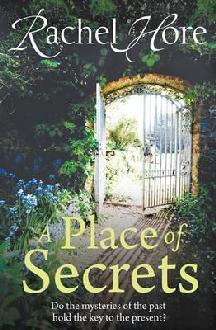
A Place of Secrets by Rachel Hore is my April 2025 book of the month. Four historical novels and one paranormal this month – the latter proving I can diverge from my well trodden path occasionally. One of the historicals was a beta read which I can’t say much about – except that once it’s launched on the world, it will be a must read. Check the rest out below.
A Place of Secrets is an intriguing sort of dual timeline, with lots of threads twining around the core story, which the author deftly brings together. Dreams, omens, gypsies, broken hearts and maliciously destroyed futures, even murder, all play their part. A good read.
Other April reads –
Consequences E M Delafield This came with The War Workers (read last month as research) and, like that book, was very much a character study. Alex is the eldest child of a well off couple, born and raised in that period when life was transitioning from Victorian times to the much more relaxed Edwardian code. Pretty, articulate, she nevertheless finds herself always in trouble of some sort, and her life becomes a series of rather dramatic wrong turns, including a long stint as a nun, and unhappiness. Not an uplifting read, but I found I had to know what happened in the end – no spoilers though.
A Game of Wings and Marks Rebecca Crunden. This appealed to the magical realism fan in me, although this is actually paranormal romance, and well done too. See my review here.
A Child in the Forest Winifred Foley. I’d read this ages ago but wanted to remind myself for work I’m doing with Dean Scribblers in a local primary school. Foley’s autobiographical account of growing up as the daughter of a coal miner in a small village in the Forest of Dean in the early 20th century is a delight. Times were tough, but the kids didn’t complain about having to walk 1/2 mile before school to fetch water from a stream, or forever feeling hungry – they had acres of oak trees and ferns to play in, and the annual chapel treat to fill their tummies – and love and freedom. A delight.
A place of secrets Rachel Hore
_________________________________
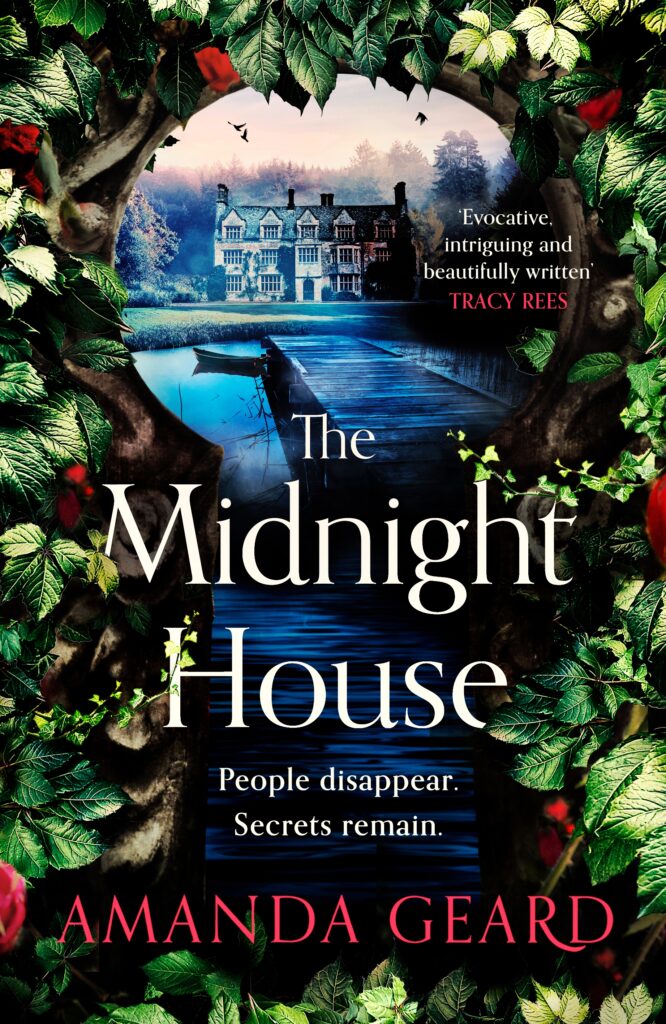
The Midnight House by Amanda Geard is my March 2025 book of the month. Much of my reading is centred on research for the new book at the moment, some more helpful than others. Check them all out below.
The Midnight House is a triple timeline set during WW2, the late 1950s and 2019. When Ellie Fitzgerald’s journalism career and her long term relationship both fall into tatters, she flees home to a tiny village in rural Kerry. There, a letter in a box of second hand books from the old house on the hill, Blackwater Hall, awaken her reluctant investigative tendencies. But the search for the charming, lively Charlotte Rathmore, daughter of the house and presumed drowned in 1940, brings Ellie far more than she could ever have anticipated. An engaging read, where the mystery appears to be solved only to open another line of questions, with well-rounded characters, brilliant settings – especially wartime London. An interesting insight into Ireland history and culture is a side benefit to a well-told story with some lovely writing. Highly recommend.
Other March reads –
Coming Home to Hummingbird House by Jane Harvey – Book 4 in the popular Hummingbird House series, with all your favourite characters, especially the much-loved Betty. Read my 5 star review here.
The Household Stacey Halls
Charles Dickens and a very wealthy young woman establish a home for fallen young women deemed worthy of a second chance. Having served their time, the women will be taught household skills, and how to read and write too if needed, and then given passage to Australia to make their way as servants. Based on the real Urania House established by Dickens and a Coutts heiress, this was an engaging if not compulsive read. I got lost a bit in all the characters and their families, but certainly mid 19thC London was well portrayed and the women’s lives brought very much to life.
Harriet’s Family Sheila Hayward
One of the books read for research and enjoyed for itself (it was only vaguely useful!) A fascinating and meticulously researched piece of family history set in Bristol, which paints clear pictures of life in the late Victorian era through to mid 20thC. Harriet saw a lot change in her lifetime, and a massive increase in the affluence of her family as a normal, working class family. I did get a little lost with all the names – especially when still in the period where babies were named after other family members, or even after siblings who had died as babies. A family tree would have been most helpful. An enjoyable as well as educational read.
The War Workers E M Delafield
Written some 100 years ago, this was also research and served as a fascinating insight into novel writing of the time. English writer in the early part of the 20thC (b 1890 d 1943), and was only in her 20s when she wrote The War Workers. It’s a tale of its time, set in WW1 and focusing on an aristocratic young woman who is in charge of something called the Midlands Hospital Supply Depot and whose chief characteristic is the desire to be seen as a selfless martyr to her work. While perhaps not helpful for historic research, the novella gives insights into the thoughts, feelings and aspirations of the young war workers, which might be helpful. The style is delightfully old-fashioned, with lots of high-falutin’ language, head-hopping, and no actual plot to speak of – what today we would call a character driven novel.
The Midnight House Amanda Geard
_________________________________
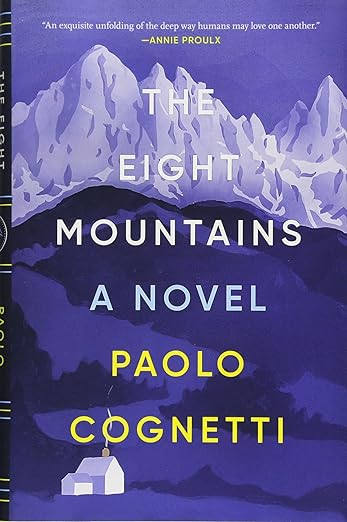
The Eight Mountains by Paolo Cognetti is my February 2025 book of the month. Another mixed bag of books this month, some disappointments, and a heart warming debut from a local author friend. Check them all out below.
Not a book I would have chosen for myself, but the last of my Christmas present reading. I very much enjoyed it, although it read more like an autobiography than a novel to me. Having lived in Switzerland and spent time in the mountains, the scene setting was vivid and nostalgic. I could hear the cow bells, see the green slopes and the snow. Not a book you can’t put down, but a slow meander through two very different lives bound by childhood friendship. My only disappointment was the ending … again (can no one write endings any more?) as it kind of just tailed off … But highly recommend nevertheless. Confession: I have bought another book by the author, The Lovers, and will get to it in due course.
Other February reads –
Just Benny Alex Banwell Congratulations to friend and author Alex for the relaunch of her debut novel, the first in a series. I very much enjoyed this tale of a young boy with epilepsy struggling to be ‘normal’, and his family’s struggles alongside him. Read my review here.
The Book of Beginnings Sally Page
I loved Page’s earlier book, The Keeper of Stories and reviewed it some time ago. In The Book of Beginnings, Jo Sorsby moves temporarily from ‘up north’ to London to mind her Uncle Wilbur’s stationery shop when he falls ill. Jo is recovering from a relationship break up and the apparent loss of her dreams to have a baby, plus she and her best friend parted on strained terms. London will give her a chance to assess her life, decide what she wants to do, but it proves so much more when she makes friends with a vicar who has absconded from her parish, and an elderly man researching a book about ghosts … While I enjoyed The Book of Beginnings, it didn’t have the same heart tugging resonance and need to know how it turned out as The Keeper of Stories. In fact, I found it rather sentimental with a good deal of mawkish rambling about friendships and family and not much of an actual story. The best bit was the disclosure of why the vicar absconded.
The Ravenswood Witch Jenni Kerr
A young woman fleeing from an unnamed horror literally falls into the arms of a sad but kind stranger. Guess what? While an entertaining read in many ways, this was a book which for me never realised its potential. An excellent basic plot, but with ‘surprises’ that weren’t surprises, and a writing style which was rather ordinary. Also, too much space given to a character who turned out not to warrant it. Poor structural editing in my view, and not tempted to read any more Jenni Kerr.
A Girl Called Rose Kaye Seeley
I’m having Rose-mania right now, as Rose is also a character in The Ravenswood Witch and of course, the central character in my own new novel-in-progress. I bought this because it’s set around the first world war so would, I thought, have been good research, but this Rose didn’t grab me at all and I passed pretty early on.
The Eight Mountains Paolo Cognetti
_________________________________
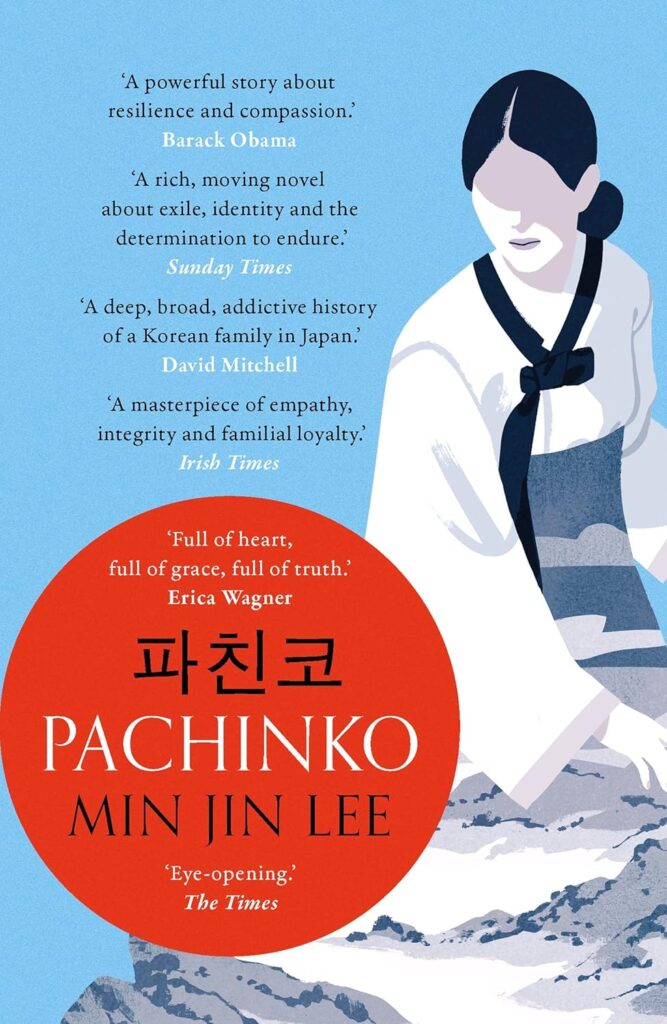
Pachinko by Min Jin Lee is my January 2025 book of the month. Despite the arrival of the puppy, Charlie, I managed to make my way through a few novels, a book of short stories and then there was a DNF. Check them all out below.
Pachinko was a Christmas gift and it’s a very different, and thoroughly enjoyable, type of read. ‘Sweeping’ is in this case a most apt description, covering the history of Koreans in Japan throughout the 20th century as seen through the eyes of one family. A topic I knew nothing about, as also had no idea what pachinko was. I was totally engrossed following Sunja and her family as they navigate their way through the most dreadful of times to reach success, of sorts. It’s not a ‘can’t put down’ but the characters are very real and the tale beautifully told. Highly recommend.
Other January reads –
A Ladder to the Sky John Boyne
Maurice Swift is a young writer aspiring for fame, if not fortune. He doesn’t care how he gets there, and the novel essentially tells the sorry tales of all those he screws over in his desire to achieve his ambition. It’s not an enlightening tale. I find my enjoyment of Boyne’s novels variable – from loving The House of Special Purpose to mediocre about this one – and this might be my last. An intriguing premise, a most unlikeable protagonist (I couldn’t find a redeeming feature), a handful of nice character portraits (eg of Gore Vidal, and others who are fictional) but an ending which just petered out in my view. I also found it a bit nasty, frankly – like Boyne was venting, and while I loved his venting in The Echo Chamber, this one felt different, a little sordid and very cruel.
The Wishing Sisters and other Forest Tales Maggie Holman
A friend passed this to me because the author is a local writer, one whom I’d not heard of. It seems that Maggie has lived in Europe for many years, which would explain it, but her roots in the Forest of Dean are deep if these tales are anything to go by. Delightful, mystical, with bits of magical realism (of course, I loved that). And beautifully written.
Broken Chances Eve Koguce A charming novel about a young woman from Latvia who marries an older Englishman and moves with him to a tiny island off the English coast. But his charming courtship in her country doesn’t translate to their new environment. Read my review here.
Small Things Like These Claire Keegan
A short and beautiful read, given to me for Christmas. I believe the film is good too, must look for it and for more Claire Keegan. Loved Bill, his stolid thoughtfulness, his battle to do what is right vs living a comfortable life and keeping his adored wife happy. I was kind of sorry to see where it ended – the next scenes would have been fascinating – but as with all good tales, especially short ones, it was exactly the right place to leave Bill.
The Butterfly Room Lucinda Riley A Did Not Finish, I’m afraid. I managed the first part, set in 1942, although there was a lot of narration and little action and dialogue – and who on earth couldn’t work out what beloved Papa was really up to?? But then when it skipped ahead 70 yrs, and became an information dump of back story, I completely lost interest. I cared nothing for any of the characters, whatever age they were at. I’ve not read Riley before and unlikely to attempt another one as an author’s style tends to be pretty consistent across novels.
Pachinko Min Jin Lee
_________________________________
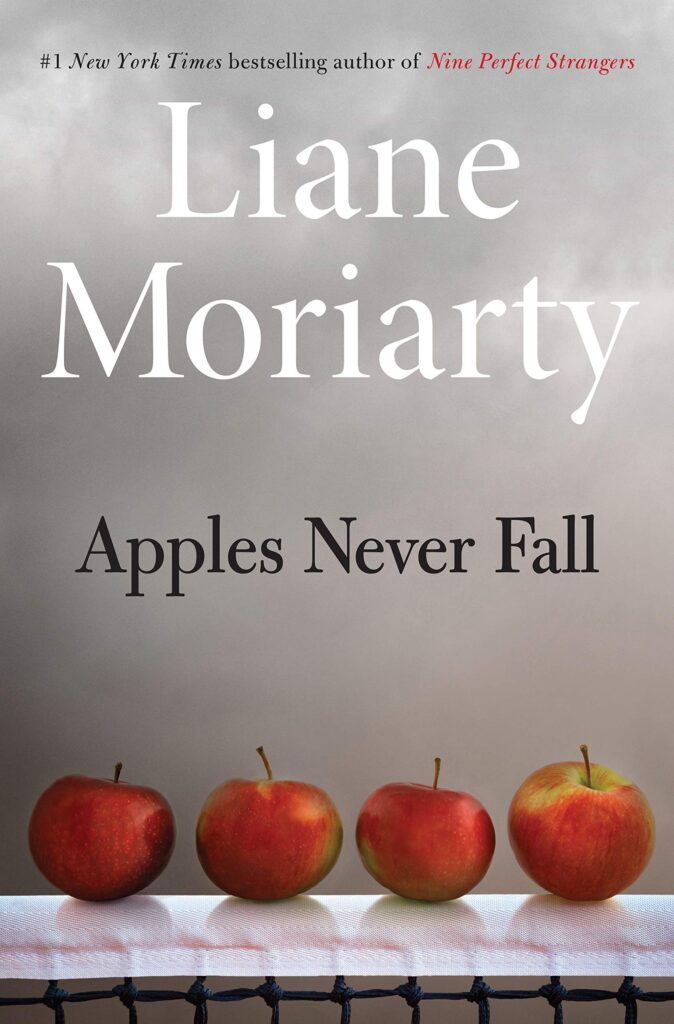
Apples Never Fall by Lianne Moriarty is my December book of the month. The rest of the reading included a disappointing historical fiction, a departure from an author friend into a new genre, and a couple of good reads of magical realism, one of which might have made it to the top of list but … see below.
I giggled a lot throughout Apples Never Fall and related closely to the main protagonist with her heartfelt endeavours to keep abreast with the modern world. That it’s set in my home country of Aus also helped.
When 69 year-old Joy Stanley goes missing, it takes a week for her grown children to realise and then worry, especially when her phone is found discarded under the marital bed. Set in Sydney, the mystery is brilliantly told, the pieces coming together in that perfect, ‘yes that makes sense’ moment. It’s pacy and full of rather sardonic humour, which I loved. The characters are totally flawed and realistic.
I also enjoyed the way Moriarty used one-off points of view in short scenes to enable us to see her key characters from a different perspective – and how even these brief encounters contributed to the overall story. Complex – I bet her spreadsheet for keeping track is fascinating.
There’s a TV series – I started it, discovered it was set in Florida, the first character opened their mouth and I turned it off after one whiny sentence. Such a shame!
Other December reads –
The Magician’s Lie Greer Macallister
I found the premise of this book fascinating – two of my favourite books combined the blurb (falsely) promised – and enjoyed the sample enough to buy it. But sadly, I have to say I couldn’t really engage with it. Too much melodrama and too little emotion. The ‘lie’ was hardly the great reveal one would expect given it’s the title of the book, and the ‘who couldn’t see it coming?’ ending finished it all off for me. The writing was good though!
The Cautious Traveller’s Guide to the Wastelands Sarah Brooks
Very different, and a fascinating concept built around the Trans Siberian Express, which must now travel the ‘Wasteland’ in question where no one who ventures there ever returns. But the train goes back and forth, carrying goods and brave passengers – and making The Company a fortune. But can it last?
A vivid and entertaining read, let down by the ending which was okayish, I guess, but didn’t leave me with that ‘yes, absolutely’ feeling. Endings seem to be a constant disappointment to me these days!
The Winter Ghosts Kate Mosse A delightful piece of magical realism where one man discovers that he doesn’t have a monopoly on grief and, to be blunt, worse things have happened. Set in the Pyrenees in winter, with vivid scenery and characters deftly brought to life. Short and satisfying.
And then you were gone Ivy Logan
A pacy read about the relationship between a mother and her daughter. When Sophie is bullied at school, she loses her joy in life, but when Nina, a fantasy author, tries to bring her daughter back to her old self, things get interesting. A departure into a new genre for Ivy, who is well known for her fantasy books. Read my review here.
Apples Never Fall Liane Moriarty
_________________________________
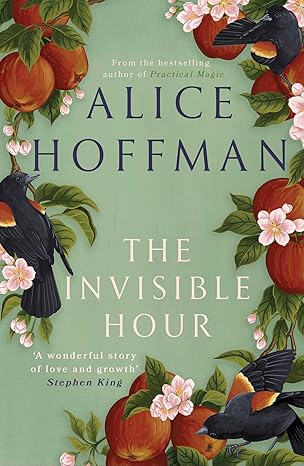
The Invisible Hour by Alice Hoffman is my November book of the month. The rest of the reading included a debut, a currently popular book, and a binge read of an old, old favourite.
Mia grows up in the Community, run by the charismatic and forceful Joel Davis. Her mother, Ivy, came from a very different place, a comfortable well-off home. But Ivy rebelled, and now forever regrets her decision to stay when taken to the Community by a friend as a pregnant 16-year-old rejected by her family. However, Ivy’s tiny acts of rebellion instil in Mia a love of the crime of reading, and she often sneaks away to her local library.
There she finds a first edition of an old book with what appears to be an equally old inscription inside it – to herself. Unearthing this mystery and discovering her true self in the process is a magical read.
I can’t do better than quote an existing review: ‘A little bit of cult life, a little bit of magical realism, a little bit of crime fiction, a little bit historical fiction, a little bit of time travel, a little bit of crafting a novel, a little bit of romance.’
This all added up to a satisfying read, with strong women, appealing heroes, bad men getting in the way of life, and – best of all – gorgeous writing.
Other November reads –
Mrs England Stacy Halls Mostly enjoyed it, especially the way she leaked Ruby’s horrific backstory bit by bit. Beautiful writing, engaging, great characters. But the ending didn’t work for me – there’s the great climax and then an awful lot of follow on which wasn’t very interesting. I kept expecting something else to happen, possibly involving that damn glove!
Hope by the Sea Tessy Braun A debut novel, beautifully set in Cornwall, with strong characters and a well-handled dramatic plot. See my review here.
The Chronicles of Narnia CS Lewis Favourites from childhood, the language might be outdated, the writing old-fashioned, but those stories are as engaging as ever. Here’s my review.
The Invisible Hour Alice Hoffman
_________________________________
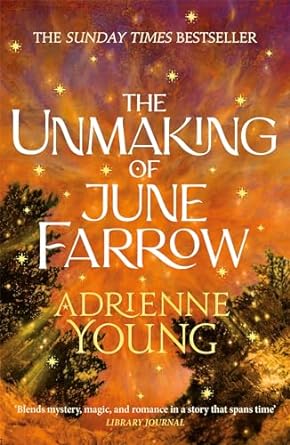
The Unmaking of June Farrow Adrienne Young is my October book of the month. See what else I read below – more historical fiction, magic realism, Celtic myths and dual timelines.
June knows the women in her family always get ‘sick’. Their minds begin to wander at some point, as if they’re in two places at once …. When June recognises the symptoms in herself, she at first despairs and then determines to find out what exactly is going on.
Thoroughly engrossing – not sure I ever did completely get my head around how it all worked, but it was fun trying. The small town, isolated setting was brilliantly depicted and the characters realistic. A fast, pacy read.
Other books I’ve read in October –
The Shadow Key Susan Stokes Chapman – This was nearly my book of the month, but see my review for why it missed out.
The Station Master’s Cottage Philipa Nefri Clark – I bought this because it was set in Victoria,
Australia, and the author did a reasonable job of summoning that southern coast landscape, although she tamed it somewhat. The story however, wasn’t for me –
the kind of book churned out in their thousands and read by an audience eager for romance and hunky men, and damn the quality of the writing. Not tempted to
read any more. Thinking I might need to write some though – they seem to be earners!
Guilty by Definition Susie Dent As a matter of principle, I don’t buy books by celebrity authors, but this one was given to me and I like Susie Dent – a feeling enhanced when I read how the book came about and her humility over the whole thing. Glad I overcame my prejudices as I found it a good read – here’s my review.
Once Upon a Time in Wales Gill Garrett A fascinating and well written compilation of Welsh myths, legends and bits of maybe history, told by the author along with information about the current geography and, especially, walking routes. Being a walker, history lover and one who drinks in legend and myth, I very much enjoyed this book and am keen to try out some of the walks given Wales is not exactly from here.
I particularly enjoyed the tale of how the River Severn came to be known as Sabrina – an alternate to the one I know involving Romans, Celtic kings and generals, slave princesses, and river nymphs (which tale is also told in the book). With its atmospheric illustrations, this is a book to fire the imagination, and one which deserves more readers.
The Forgotten Bookshop in Paris Daisy Wood – I had forgotten I’d already been disappointed with one Daisy Wood (The Royal Librarian) and this later read has firmly convinced me not to read this author again. The writing was stilted, and much much more emotion could have been poured into this book, especially on the historical side. For example, it would have made things so much more compelling to have caught a glimpse of the previous life of one of the Jewish children rescued from the round up. I had a hard time getting involved with Jacques, or with the modern day heroine (whose name I can’t remember, she made so much impact.) Disappointing, given how much research went into this book.
The Unmaking of June Farrow Adrienne Young
_________________________________
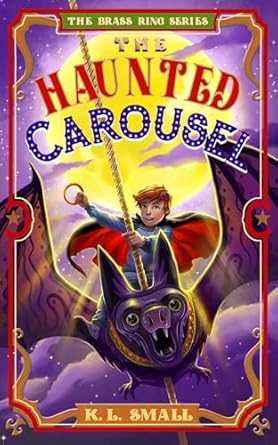
The Haunted Carousel K L Small is my September book of the month. See what else I read below – a lot of historical fiction, dual timelines and some poetry too.
I read this as an ARC, sat down one evening to start it and didn’t look up – even to take a sip of wine – until I was finished. Here’s my review.
Other books I’ve read in September –
The Story Collector Evie Woods – I much enjoyed The Lost Bookshop by this author. This has its own charm but I found it more shallow, lacking the character depth and rich writing of The Lost Bookshop. Which is a shame when the story is about Irish fairies, death, loss and of course redemption. Another dual timeline – I will get off those eventually.
Yellow Lily Lawson Lily’s third book in her Rainbow poetry series, and another charming read. Check out my review here.
The Hiding Places Katharine Webb Not wanting to do a spoiler alert, all I will say is that I think the big surprise in the last two chapters was annoying and like she was laughing at the reader. It felt a bit nasty to me, TBH, rather than clever. Totally confusing. It didn’t help that I already wasn’t much engaged with the story, or the characters, but kept reading because her descriptions of the countryside were very lovely and I was stealing
bits and bobs of phrasing. I mean, who can’t help but love a sky like clotted cream??
The Distant Hours Kate Morton very very long … I am a huge Morton fan and one of the best books I’ve read recently is her recent one, Homecoming. But The Distant Hours was written in 2010 and is a brilliant example of how much a writer’s skill develops over time. The gorgeous imagery, the ability to make you see a place, to be the characters, is all there. But the very gothic story is forced in many places, somewhat unbelievable as the mystery is solved (or one of the many), and the whole thing is far too long. The ending is so drawn out I felt like I was witnessing Dame Nellie Melba’s numerous comebacks. Still, I gave it 4 stars on Goodreads because I’m a Kate fan, and I did read it in a very short space of time so that tells you something! PS A dual timeline.
The Secrets of Flowers Sally Page Another dual timeline and charming. Both stories work, and work together. Emma is a damaged character who finds peace in flowers in more ways than one, while Violet Bloom is an historical figure who was a stewardess on the Titanic and survived. The chapter headings are all named after flowers which are mentioned in/feature in the chapter. A gentle, satisfying read. Must look for her other books.
Wait for me Santa Montefiore A DNF. I know this author is incredibly popular but I wasn’t remotely invested in the characters or the story, and when it was obvious where it was going, I gave up. Even though it was a dual (or actually a triple timeline). I was put off initially by some basic errors of geography (Victoria is not in South Australia) and other bits, which didn’t help.
The Haunted Carousel K L Small
_________________________________
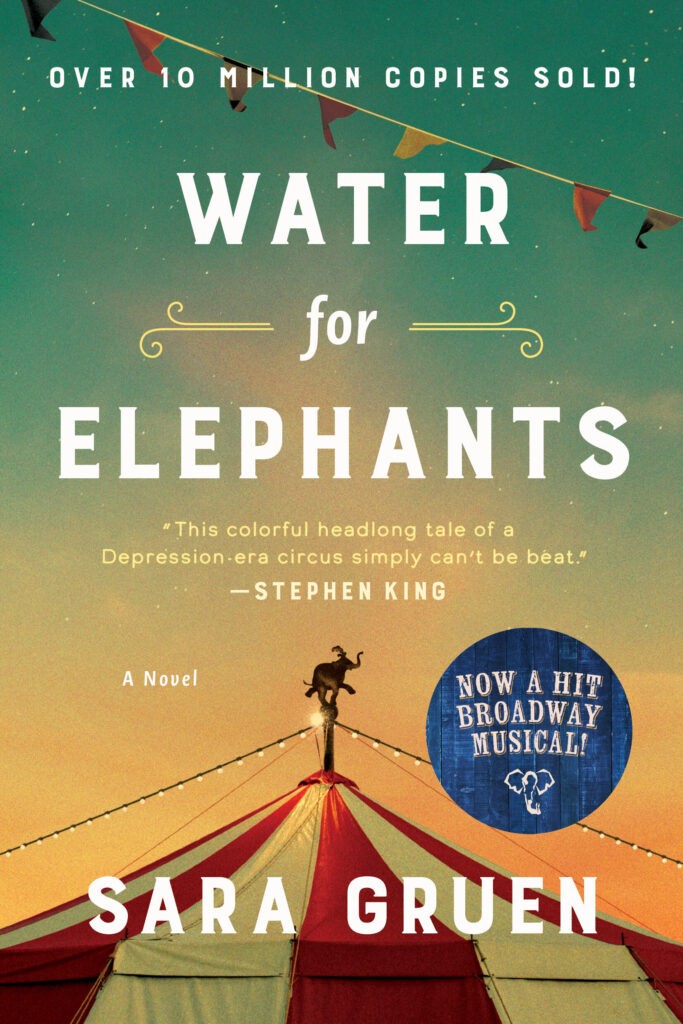
Water for Elephants Sara Gruen is my August book of the month. See what else I read below.
A brilliant book, set during the Great Depression, and thoroughly researched, the story is told by the 91 (or 92 or 93, he’s not sure) Jacob Jankowski about his time in a circus. When the young Jacob learns he’s an orphan and penniless just a few days before sitting his final veterinary exams at Cornell, he walks away from his life to find himself accidentally the vet at a struggling circus. What he goes through, what he learns about himself, and how he finds the love of his life all in three months, is a fast-moving and colourful read. Gruen paints her scenes, her people are so real you can hear them talk, and her animals likewise. Incredibly sad in parts, at the end properly uplifting. The author’s notes are highly worth reading, adding to the heartbreak in some instances. It was a different world back then.
Other books I’ve read in August –
All the Broken Places John Boyne – I haven’t read The Boy in the Striped Pajamas and may never do so – the hints in this book make it sound rather too much heartbreak for me. This sequel worked perfectly as a standalone however, and was a thoroughly good read. The main character is not an entirely likeable woman, but realistically portrayed and it was her emotions which drove the story for me. This would have been 5 stars except I must take issue with the practicalities of the ending. Can’t explain, as that would be a spoiler!
The Lightbody Bequest, Carolyn Ruffles. A good, pacy read. Check out my review here.
Weyward Emilia Hart I enjoyed this tale of three women whose line had come down through the centuries. Their stories were pretty predictable (witchcraft, seduction of an innocent, domestic abuse) and not a lot actually happens, but the way the author describes their relationship with nature and how they discover and use the power within themselves was nicely done. Could have done without the epilogue which smacked far too much of giving in to the urge to explain. It kind of killed the (again predictable) ending. A light, entertaining and quick read.
The Maiden Kate Foster I nearly gave up on this early on, not much liking the jaunty 1st persons (yes plural) narratives nor the characters, but in the end I was happy I’d persevered. The story settled into something more compelling than the opening chapters suggested, as they should, as the sorry tale is based on a true story. Forever in the shadow of her beautiful and good young sister, Christian is easy prey to be groomed by her handsome and philandering uncle-by-marriage. But Uncle James isn’t satisfied with one woman at a time – he keeps professional whore Violet in luxury in the turret of his castle. And then … but no spoilers. Brilliant portrayal of Edinburgh both physically and its society at the time (late 17thC).
Water for Elephants Sara Gruen
_________________________________
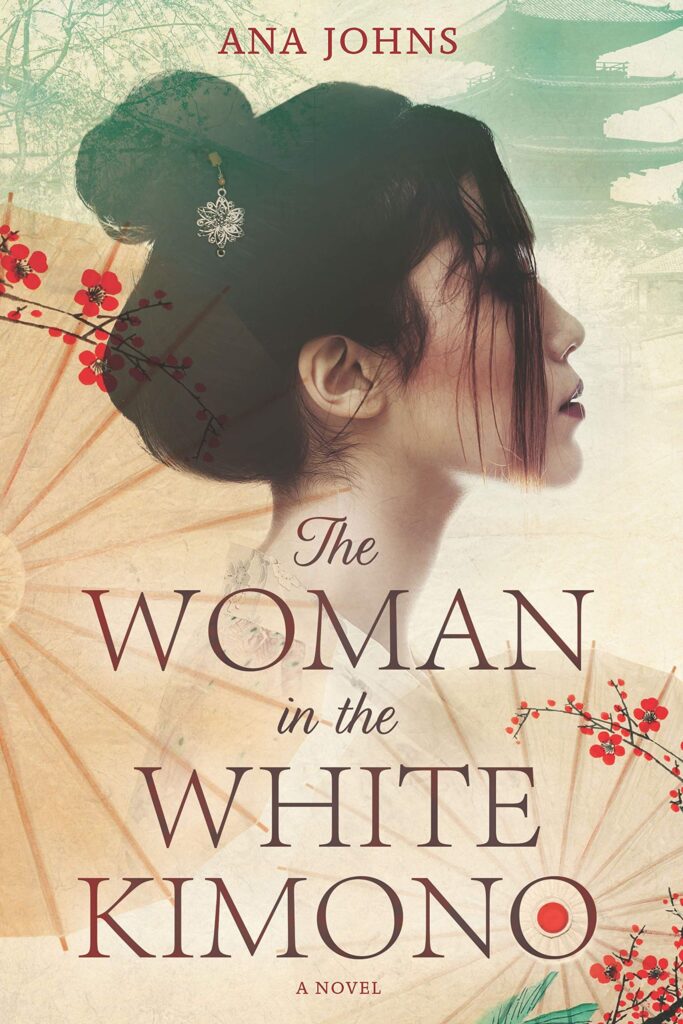
The Woman in the White Kimono Ana Johns is my (hard) choice for July. Read what else I read below.
Heart breaking and an excellent read. After his death, Tori Kovac discovers her beloved father’s stories from his time in the US Navy in Japan in the late 1950s may have more truth to them than she realised. Her search for what really happened, told in parallel with the story of the time, is beautifully done, especially the historical part (I just like historical, let’s face it).
The author pulls no punches on either side, basing her story on her own father, I believe, and including actual people and events of the time. Given the reality was horrifying, I thought the ending was handled particularly well. No spoilers though!
Other books I’ve read in July –
The Miniaturist Jesse Burton – the book before The House of Fortune which I read in May and worked perfectly well as a standalone. Reading that first didn’t spoil my enjoyment of The Miniaturist. In fact, knowing the characters as they were much later, and seeing how the story played out from now to then, made it more interesting.
A wonderful insight into Dutch society at the time, brilliantly drawn characters and settings. I was a tad disappointed though in not receiving a proper explanation about the Miniaturist herself – I felt this was left to slide, that the author didn’t really know!
The Nightingale’s Castle, Sonia Velton I wasn’t sure why I’d bought this when I re-read the blurb – murdered girls, vampire countesses … but I thoroughly enjoyed it as well-researched, well-written historical fiction. Atmosphere aplenty, for better or worse, and well-drawn characters. The story itself turned out to be reasonably gentle, (barring the punishments of the time), which suits my reading style. Will look out for Sonia Velton’s other books.
The Woman in the White Kimono Ana Johns
_________________________________

The Bookbinder of Jericho Pip Williams is my clear winner for June’s reading. Read what else I read below.
It seems I’m developing a habit of reading books in the wrong order. This came up somehow – perhaps one of those deals Amazon sends me on a regular basis – and as the title was familiar, I bought it. Here’s my review.
Other books I’ve read in June –
The Royal Librarian by Daisy Wood. Dual timeline historical fiction set during World War Two and today, and very disappointing. The story read like something out of an old-fashioned Boys Own – plucky Sophie sacrifices all to save the royal princesses but is pardoned when Elizabeth personally visits her in prison etc etc. Plot holes galore. Wooden characters.
Winter Solstice by Rosamund Pilcher. A friend sent me this a while ago and I finally got around to reading it. Published in 2000, it’s a delightful old-fashioned read, like sinking into a well-used armchair, feet curled, fire blazing, hot cocoa at the ready. Second chances, romance for the elderly, and characters to love.
A lonesome night in October by Roger Zelazny (1993). Adored this kinky, imaginative and just plain fun bit of SFF. Thank you to my husband for passing it on. Here’s my review.
Murder in the Dark by Margaret Atwood – a very slim collection of extremely short pieces, more like thoughts than stories. I do wonder if Atwood read The Artists Way and these are her morning pages? I wish mine read like that. Many of the stories seemed to relate to writing, many of them to women and their place in the world, and a handful about men. A handy book for bedtime reading, a story – or two or three – at a time.
The Lost Apothecary Sarah Penner – too many coincidences, too easy! I’ve linked this Goodreads review which so perfectly reflected my own feelings on the matter! I was more generous and gave it 3 stars though.
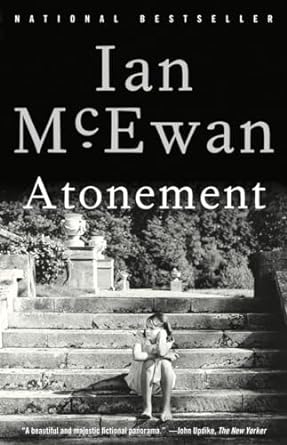
Atonement heads my eclectic reading for May
Ashamed to admit I hadn’t read any Ian McEwan before, but this was recommended and I’m pleased I took it on. I had some concerns in the first few pages, as there’s a lot of narrative and internal dialogue in this book. That was dispelled once things started happening. Fourteen year old Briony’s view of the world and over imaginative brain, left me with feelings of dread of what could go wrong very early on. Rightfully so. My favourite character was Robbie, which was why the ending left me rather breathless. Such a brilliant, clever ending. So gorgeously, richly written you are there with the characters.
Other books I’ve read in May –
I was so excited by Atonement I posted in a reading group on Facebook and was recommended other Ian McEwan books, and especially On Chesil Beach. A slim volume and for me a disappointing one. Here’s my review.
The House of Fortune Jessie Burton Loved it. Beautifully written, wonderful characters. It’s the sequel to The Miniaturist, which is now on my TBR pile, but works perfectly well as a standalone – and made me want to read The Miniaturist, which has been on my wish list for ages. The writing is such that you are there in Amsterdam in that great house with all its secrets, and Thea is such a wonderful protagonist, with her boldness and innocence, her intelligence and tempers. A perfect ending, and the only one that it could be.
Testament of Youth Vera Brittain. A DNF I’m afraid, although I know it’s sold trillions! I bought it for research, and once I got what I needed I left Vera to her internal ramblings and her poetry. Of its time, but to me she came across as pretentious and snobbish, while decrying the snobbery of the values she’d been brought up with. And crying about the war and its futility, on both sides, while at the same time sticking her middle class nose up at regional accents made her appear hypocritical. The best line, was when her mother complains during the war how hard it is to get help, and Vera tells her that people will either to have live permanently in hotels or [ed note: gasp] do the work themselves.
Myrtlewood Mysteries Book One by the improbably named Iris Beaglehole (it has to be a nom de plume, it so wonderfully suits the style of the book). I think I bought this in the spirit of looking at other magical realism books, but I found it inane, with two dimensional caricatures of characters, and a stupid plot and it was nearly a DNF. These books are also highly popular, so there you go! Good on Iris. (It also needs proof reading.)
Serpent Dominion Christopher Mitchell. The first in a series, and while I won’t be reading the rest (I’m not good at series), this fantasy tale was enjoyable and entertaining. Well written, with goodies and baddies on both sides (and possibly on all three sides, but that will be in the next book I guess), and who can’t be drawn into a world ruled by dragons – who, by the way, are every bit as venal as the humans. Excellent world-building, and I quickly understood who was who in this highly hierarchical society, so well done Mr Mitchell.
Atonement Ian McEwan
_________________________________
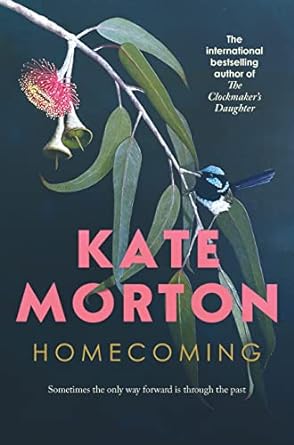
Homecoming is my book of the month for April
I’m a long time Kate Morton fan. Most of what I’ve read of hers is dual timeline historical fiction with a touch of magical realism. Just my thing! But what I loved about this book is that it’s set partly in the 1950s in the Adelaide Hills, South Australia, which is when and where Keepers is set. So for me it was very much a homecoming. The murder mystery keeps you guessing, the characters are great, her depiction of the Australian landscape is divine, and all round, a highly enjoyable read.
Other books I’ve read in April –
Sandcastles, by good friend Lily Lawson. Lily’s first and very successful venture into short stories/flash fiction. Read my review here.
A Wrinkle in Time Madeleine L’Engle. A children’s book which has been transferred to screen a few times, published in 1962. I read it because it’s children’s fantasy and a ‘classic’, but I have to say it hasn’t aged well. It seemed a little flat to me (which is also an in joke if you’ve read it), and suspect it wouldn’t get a look in today.
Love you a Latte R S Jonesee. Jonesee’s romcoms keep getting better and while there are the only romcoms I read, I always enjoy the fun escapism. Here’s my review.
The House of Special Purpose John Boyne. This would have been book of the month except for the Adelaide Hills. Again, an author I love to read, varied and brilliantly researched. This book set at the time of the Russian Revolution and then in the 80s had me wondering until the last few pages – Is it? Isn’t it? Cleverly done and an engrossing read.
Murdered by the Books Jodi-Casstevens Short. The debut from my good friend and critique partner – I know this book well, and love it. For the cosy mystery fans and anyone who loves twists and turns (and rather cute firemen…). My review here.
Trust, Hernan Diaz. Pulitzer Prize winner and I have no idea how it ended up on my kindle, but it did and I read it – to the bitter end. I asked in a FaceBook reading group if it was worth persevering, and there were many Did Not Finishes and a handful who said, yes, it all becomes clear in the last section. This was true, but frankly, my dear, by then I didn’t give a damn. Note to self (again, how many times do I need to remind myself?): never read a major prize winning book …
Homecoming Kate Morton
_________________________________
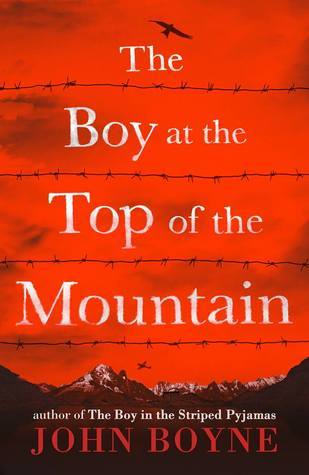
The Boy at the top of the Mountain – heads March’s list
My March book of the month, although it was a close call. This is not your normal WW2 historical novel. No brave nurses or prisoners of war, although the concentration camps get a mention.
Check out my review here.
Other books I’ve read in March –
Lady Oracle, Margaret Atwood, published way back in 1976. Joan Foster is a well-meaning, somewhat aimless woman who appears to stumble into situations which she then makes the best of. But when she does something positive to escape the boredom of her life, she’s filled with regret on the first day. I enjoyed Atwood’s gently wry telling of this tale, but I have to admit, her later novels are for me far more engaging – I guess that’s what happens when you write a lot of books. You get an awful lot better at it!
A River in the Trees Jacqueline Mahoney. A dual time line set in Ireland in 1919, during the War of Independence, and a century later, about the quests of two related women to define who they are, and what that means in terms of family. Excellent character and setting depictions, and a fascinating insight into the history of the time.
A Possible Life Sebastian Faulks A collection of inter-linked short stories, or as the blurb describes it, a novel in five parts. The stories take us into the far and more recent past and into the near future, and across countries and continents. Faulks is one of my favourite novelists, since I was introduced to Birdsong decades ago, and he doesn’t disappoint here. The breadth and depth of his research shines through, easily conveyed, in these stories of what boils down to human connection and how deeply it goes. Highly recommend.
The Luck of the Irish Cozy Mystery Anthology – Good reading in a wonderful cause. See my review here.
The Mysterious Disappearance of Mr Darcy Kelly Miller. A Regency romance mystery which will keep you guessing. See my review here.
The Lost Bookshop Evie Woods. A delightful bit of magical realism and another dual timeline tale. Two women, and a young man, find their destinies interwoven with the help of old rare books and an old rare woman who may or may not exist. The idea of a tree growing in my bedroom held a certain appeal! The harsh truths of how ‘difficult’ women were dealt with not all that long ago, did not. Highly recommend.
The Boy at the Top of the Mountain John Boyne
_________________________________
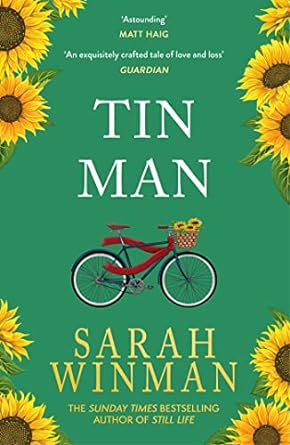
Tin Man Sarah Winman
As the blurb says: This is almost a love story. But it’s not as simple as that.
I love Sarah Winman and reviewed her book Still Life here some time ago. Her characters get into your blood, her stories are very human and her writing is the kind I adore – rich and gorgeous.
Ellis and Michael are twelve when they meet each other, and their friendship is moulded by their mutual love of art and reading, and of Ellis’ mother who treats Michael as if he is as much her son as Ellis. The story jumps from 1996 back to the 60s and then forward again, and the ‘what happened in between’ is the tale we discover as it unfolds page by emotional page. Not a long book, but one it’s hard to put down.
You can find Tin Man here.
Other books I’ve read this past month –
The Echo of Old Books, Barbara Davis. A very old love affair which ended in apparent deceit and betrayal, comes to light in two old journals. Okayish, but a major plot hole put me off.
Lucy by the Sea, Elizabeth Strout. Set in Maine during the pandemic lockdown. I understand there are more Lucy books, but to be honest, I did not like this self-centred, brittle character at all so won’t be hunting them down.
The Echo Chamber, John Boyne. Not his normal gentle style, this is cruel and laugh out loud satire. I’d recommend it if you’re fed up with the modern world.
Tin Man Sarah Winman
_________________________________
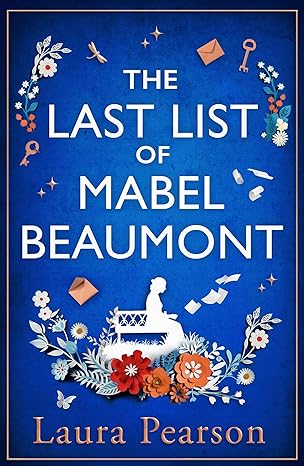
The Last List of Mabel Beaumont
Mabel’s list-loving husband of 65 years has died, leaving behind his last list. It comprises one item, Find D. What or who is D? Mabel has an idea, one which finally – after 65 years – galvanises her into the action she should have taken decades ago. Although galvanised is too strong a word, as is action.
First the gorgeous cover, then the blurb, had me quickly pressing the Buy Now button to send this book flying to my kindle. I had visions of The Unlikely Pilgrimage of Harold Fry rattling in my brain, with that book’s poignant story telling and luscious prose.
Oh dear. Mabel, I’m afraid, is no Harold with his confused and stubborn kindness. The Last List is written in the first person, and the straightforward prose does a great job of reflecting Mabel’s character. Unfortunately, it wasn’t a character I found endearing, nor a personality I became invested in. A sad, disappointed and slightly bitter woman who squandered – in my view – a chance to have some level of happiness with a kind and loving husband, given she wasn’t proactive enough to go in search of her one true love decades earlier. I would have preferred to read Dot’s story, which sounded much more engaging. Ditto the secondary characters, who came with lots of fascinating baggage which we were allowed glimpses of, but no depth, and facile resolutions. Fair enough, this was Mabel’s story, and it was nice for her that at the end of the day she found both friendship and love. (Spoiler alert!)
But the whole thing was very lacklustre. Thinking about why, I feel as if the author couldn’t be bothered to really get to know her characters. There’s a story outline which includes many modern tropes, and they were strung together with a few, not very interesting, events and conversations. Emotional depths were missing, which was particularly apparent in the rushed and neatly-tied-with-a-bow ending. Really? It was that easy after all?
Also irritating were the historical inaccuracies, for example when Mabel talks about wearing ‘itchy tights’ long before tights were worn. I can’t trust an author who doesn’t check these things out, and as for her editors …
You can find The Last List of Mabel Beaumont in the link, if you want to check it out for yourself. Thousands have loved it, so don’t take my word!
Sign up here for more reviews in my monthly newsletter.
The Last List of Mabel Beaumont Laura Pearson
_________________________________
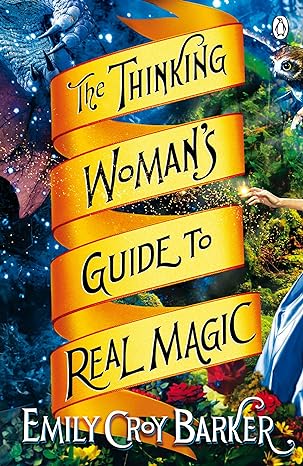
The Thinking Woman’s Guide to Real Magic
Instantly she knew she had taken the wrong trail.
I first read this book years ago when it came out (2013) and found it on the bookcase after a couple of other attempted reads failed me. (I used to read to the end of everything, now I don’t bother. Age I guess!) I didn’t remember the story, so it was a delight to read it afresh, especially as I only had vague recollections of the ending.
Nora’s life is falling apart, job and relationship wise, and she really wishes she lived a more interesting existence. With some reluctance, she goes with her best friend to a wedding in the country, but, going for a walk on a mountainside she becomes lost. Stumbling into the grounds of a grand mansion owned by the gorgeous and charming Ilissa, changes Nora’s life to what she believes she’s always wanted. Under Ilissa’s wing, Nora discovers she is beautiful, and interesting, and loves to have fun. Worry nags faintly at the back of her mind about what her friends and parents must think has become of her, but she can’t hold to the worry for long. It’s a good life, until the reality behind it all becomes horribly apparent.
Left to die, Nora is rescued by Aruendiel, a man she met briefly when she wandered to the edge of Ilissa’s lands. Nursed back to health in Aruendiel’s castle by his patient housekeeper, Mrs Toristel, Nora discovers she is living in another world altogether – one where magic is used as a matter of course, and where her rescuer is one of the most powerful magicians in the land. He should be – he’s had some 150 years of practice.
Initially highly sceptical of the notion of magic at all, despite what she’s already seen, Nora discovers she has her own talents in the area. Reluctantly, the offhand Aruendiel begins to teach her and in the process to reveal something of his own dramatic and troubled past.
I much enjoyed this book on many levels. The story romps along, and had me reading late into the night. It’s a good thing it’s pacy, and also really well written, because it’s 560 pages of small font. In those pages Barker builds a world which is harsh, highly politicised, full of intrigue and treachery, tough on the poor, even tougher on women at all levels of society, and full of the kind of magic which has zero in common with Disney, despite being used to mend broken crockery.
Nora is a relatable character navigating her way in a new world where her views and values as a 21st century highly intelligent American woman are mostly at odds with the society around her. She falters, gets furious, and picks herself up, determined to learn and find a life for herself here while not giving up her principles. It takes a lot and always there’s the longing for home and how her family must be suffering.
Aruendiel is a brilliant character – complex, seemingly cold, certainly abrupt, and with issues a mile long, he resists whatever it is he’s feeling for Nora as she creeps under his skin. The supporting cast are well drawn too, especially the lively female magician Hirizjahkinis.
While the ending is satisfying, Nora’s light bulb moment of finally discovering what it is she really wants, what her life should be about, definitely leads into another volume. I believe there are at least two more. I’m tempted, which is unusual for me.
Sign up here for more reviews in my monthly newsletter.
The Thinking Woman’s Guide to Real Magic Emily Croy Barker
_________________________________
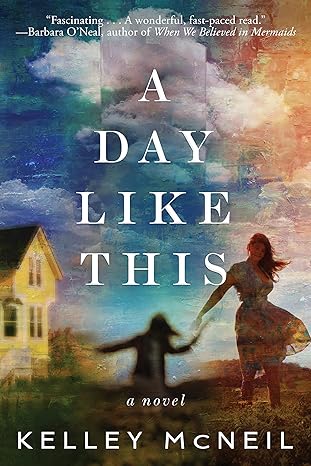
A Day Like This
As the day is coming to a close and I’m falling asleep, sometimes I’ll hear the sound of gravel beneath my feet.
Annie Beyers is happy with her rural life in the Yellow House outside New York. Money’s tight, but she and her husband have a loving relationship, and Annie adores being a stay-at-home mum caring for her bright and beautiful little daughter, Hannah.
Until the day Hannah has a fever and Annie, rushing to get to a last minute pediatrician’s appointment in a raging thunderstorm, crashes their car. When she wakes in hospital, she’s desperate to know if Hannah is okay. But, the doctors and everyone else – including her husband – tell her there is no Hannah. Annie’s old life has apparently gone. She no longer lives in the Yellow House. She lives in a very expensive Manhattan apartment paid for by her earnings as a famous artist. She and her successful businessman husband are estranged. Her sister whom she hasn’t spoken to for years and who lives in Japan, now lives in the States and is Annie’s best friend. The one bright spot is that the dog buried under a tree in the Yellow House is alive still.
The doctors tell her it’s some form of amnesia, and she will remember her ‘real’ life in time. Her family are told not to tell her the details of that life, but to allow her to recover her memories herself.
Mourning Hannah, firm in her belief that the little girl is not some figment of her imagination, Annie determines to find out exactly what’s going on. Her search takes her – and the reader – down unexpected paths. Just when I was thinking this was one kind of book, it turned out to be another, better, kind of book. I can’t say more without spoilers, but I found A Day Like This to be a totally engrossing read. Annie’s confusion, her despair, and her refusal to give in and accept her ‘new’ life with its fame and money, made me root for her all the way. She’s not a flawless person by any means, as we discover along the way. The truths Annie discovers are as much about herself as they are about her circumstances. The supporting cast is also well-defined, especially the husband whose pain and confusion broke my heart a little.
I was fascinated to see how McNeil would wrap this tale up, as for me there was no obvious ending. And this was the only mildly disappointing part. I suspect the conclusion is right for the book, but there is something about it which left me vaguely unsatisfied, as if a compromise had been reached rather than a full resolution. What would I have done instead? No idea!
It’s still a five star read, which will keep you up at nights.
Sign up here for more reviews in my monthly newsletter.
A Day Like This Kelley McNeil
_________________________________
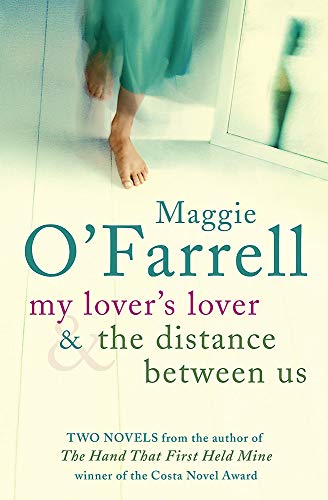
My Lover’s Lover
He feels as though she is holding on to the end of one of his essential fibres and that every step he takes away from her is, bit by bit, unravelling him.
Lily meets architect Marcus at a gallery opening at a time she needs to move out of the temporary accommodation of her mother’s house and become independent again. As it happens, Marcus and his flatmate and best friend, Aidan, have a room to spare in the echoing warehouse Marcus renovated. Lily moves in, aware of her attraction to Marcus, and, it seems, his to her.
But there’s a shock in store. Marcus’s ex-girlfriend, Sinead, whom Lily believes has died, doesn’t appear to have entirely vacated the room Lily now occupies. Or indeed the flat itself. Or even the wider world.
Lily becomes obsessed with discovering the truth about Lily and Marcus. Marcus is tight-lipped, grief-stricken. Aidan is tight-lipped too, for different reasons.
I enjoyed the unravelling of the mystery, told from different points of view and jumping back and forth in time. But it had its problems.
This was Maggie O’Farrell’s second novel, written in 1988 (according to the copyright page) but not published until 2002, after the success of her publishing debut, After You’d Gone.
I put that little bit of background here because the first thing which struck me when I started reading – having no idea when it was published – was that while the story was engrossing, the execution wasn’t quite O’Farrell as I love her. Which is why I looked to see the dates.
There were small issues which a good editor should have dealt with. For example, on occasion I had to read too long into a scene to find out who was who, which rather distracts from the tale.
But there were bigger issues which left me disappointed at the end of the day.
Normally, Farrell’s characters weave their way into your head with their complexity and reality. But in My Lover’s Lover, I found Lily, the protagonist, came across as shallow and out of her depth emotionally in a highly emotional tale. Maybe that was the point? Then there’s Aidan. He pops in and out, a bit mysterious, likeable, but it’s not until far too late in the day we discover what’s really going on in his head, and more importantly, his heart. Too late for me to genuinely feel for him.
In terms of the story itself, it annoyed me that the ‘ghostly’ appearances of Sinead are never satisfactorily explained, even in a paranormal context. They came across as implausible, made up for the sake of drama. The story would work without it.
And then there’s the ending, which is unexpected in a way which it shouldn’t be. One page this … all seems pretty final. (The quote at the top of this review is where I think the story should have ended.) The next page this … No clue as to how it happened, not even a lingering look.
I’m still a huge Maggie fan, because what I really enjoyed was the realisation how far O’Farrell’s writing has come during her 20 year plus career. Even the best of writers start somewhere. There’s hope for all of us!
Sign up here for more reviews in my monthly newsletter.
My Lover’s Lover Maggie O’Farrell
_________________________________
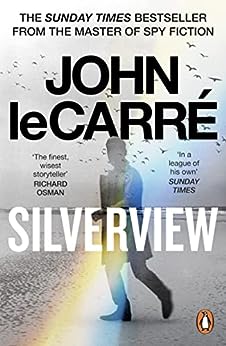
Silverview
A short sharp study of the human cost of espionage (Daily Telegraph review)
I have long been a Le Carre fan, devoured them over the years for their intricate plots, their brilliant characters, and that way he had of getting the story down – like a steadily beating drum. Sadly, Silverview is the master’s last novel and it is every inch him.
Julian Lawndsley has chucked in high flying finance job in the City to escape to the less exacting life of running a bookshop in a seaside town. Of itself, this could make a good story (I have long had one along those lines running around in my head). But Julian’s bookshop difficulties are a mere plot device for the real story, which begins when Polish émigré Edward takes a keen interest in the shop and offers to help out the son of his old school chum. The real story – you guessed it, it’s Le Carre – is spies, current and retired.
While the reader should take less time than Julian to see the lie of the land, the way spy chief Proctor goes about gathering clues, putting it all together and working towards the denouement keeps you turning those pages. The characters he unearths from way back when are straight out of Smiley’s People and all the more wonderful for that.
And as ever with Le Carre, the human element is very much at the forefront. He draws people with subtle brush strokes – implications, actions, understatements, restrained emotions. They are complicated, human, and even the ‘baddies’ win our sympathies.
Loved it. By the way, if you read it, I highly recommend you also read the Afterword by Le Carre’s author son, Nick Cornwell. It’s nearly as interesting as the book itself.
Sign up here for more reviews in my monthly newsletter.
Silverview John le Carré
_________________________________
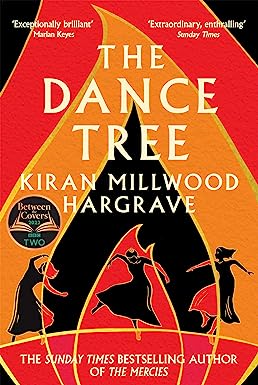
The Dance Tree
When the world is ending, what else is there to do but dance?
My July book of the month.
I adored The Mercies by Kiran Millwood Hargrave, so this was a must read. And in many ways, it’s a similar book with its over-riding theme of women who must fight, ferociously, to not just be themselves but to live a life which is not dictated by the whims of men parading as God’s messengers.
The author has used the historical mass hysteria event of Strasbourg’s dancing plague in the hot summer of 1518 as an entirely appropriate canvas on which to draw the story of Lisbet.
Lisbet has always known she brings bad luck, from the moment of her birth the same day a comet destroyed her father’s farm. She tiptoes around life, forever terrified, always on the outside. Her marriage to Henne, beekeeper, wax provider, and small farmer, started with love, but has soured over her failure to carry her babies to term – twelve losses, and Henne has yet to have ‘his boy’.
Lisbet grieves each loss, and has her own memorial to her babies, commemorated in a dance tree hidden in the nearby forest. Now, Lisbet carries her thirteenth child, due imminently, and so far all is well. She barely dares to hope.
Lisbet has one friend, Ida. She might envy Ida for her several healthy children, except Ida is married to Plater – a cruel strongman of The Twenty One, the moralistic group which ran Strasbourg at the time.
Then two people change Lisbet’s world. Her sister-in-law, Agnethe, returns from a seven year stay in a convent in the mountains – a punishment for a sin no one will confide to Lisbet. The punishment was also meant to bring a resolution, but despite the flagellation, the shorn hair and whatever else was inflicted on her, there has been no resolution. The second new person is Eren, a Turkish musician. With the Ottoman Empire pushing hard against the Habsburgs, Turks were despised as less than human and feared as devils. Yet Lisbet finds in Eren a man who listens, who understands, who offers support and solace.
Millwood Hargrave builds her worlds with delicious intimacy. She paints her settings with simple brushstrokes which set us firmly in the time, with its sights, sounds, and above all, its smells. I particularly loved the way she brought Lisbet’s gentle relationship with the bees to life, the one area where she could be proud of her skill. Her characters are similarly intimately drawn. Their longings, their motivations, their souls are laid bare to the reader in the gentlest of ways, so we feel we know them better than we know ourselves. And it’s these motivations based on the beliefs of the various characters, their interactions and responses, which drive the story.
The women dance in the town, the musicians play, the Twenty One lay down their judgements, and Lisbet learns her own dance.
A beautiful book.
Sign up here for more reviews in my monthly newsletter.
The Dance Tree Kiran Millwood Hargrave
_________________________________
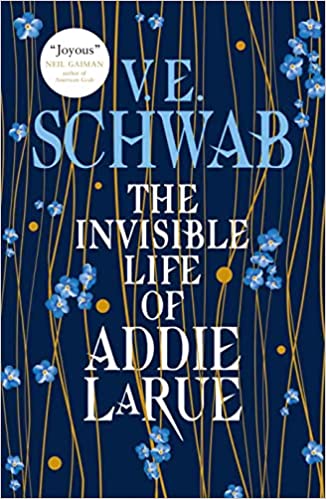
The Invisible Life of Addie LaRue
No matter how desperate or dire, never pray to the gods that answer after dark.
My June book of the month.
Addie La Rue had taken in old Estele’s wisdom, along with how to pray to the gods of river and field, and much more besides. But when Addie is about to be forced into a marriage which will see her live, grow old, and die in the same ten metre square plot, that is, her tiny home village, she discovers the only god that answers her prayer for freedom is the one after dark.
Trapped in a deal which is very much a case of ‘be careful what you wish for’, Addie is condemned to live forever, but never to be remembered by any but the god himself. Shut the door on her, and you immediately forget her. Release will come only when she gives him her soul.
So begins 300 years of a war between a girl and a demon. Schwab’s Addie is strong-willed, obstinate, and totally determined not to let the demon have his way. Although she finds ways to leave her mark, they are shadows, unacknowledged. ‘Palimpsest’ is Schwab’s favourite word throughout and after I looked it up, I understood why. (see footnote)
But Addie so lonely, even the devil has his attractions. Until the day in 2014 when a young bookseller remembers her.
As for the demon, it appears even the gods of darkness have their human side if you get to know them well enough.
I adored this book. It’s a delightful combination of contemporary romance (enemies to lovers, sort of …), historical fiction (300 years of fascinating titbits of history) and historical romance (the tall, dark stranger aiming to sweep the feisty heroine off her feet). But it is far from trite. The premise is original (who would have thought you can find that these days), the writing is sublime (for example: ‘a three-dimensional landscape of whimsy and wonder’) and Addie is a protagonist who took my heart (and soul). Schwab’s immaculate character development, her ability to take you to a place and sense it all, and the steady pace, immerse you in the tale.
And then there’s the eternal (so to speak) question to be answered: How in hell will it end? And that in itself makes the book worth reading.
My first but definitely not my last VE Schwab.
Footnote: Palimpsest – a parchment or the like from which writing has been partially or completely erased to make room for another text. In the novel, Addie’s life – her minutes, hours, days – are forever being erased and new lives built over them. But the experiences, the shadows, of her former lives remain.
Sign up here for more reviews in my monthly newsletter.
The Invisible Life of Addie LaRue V. E. Schwab
_________________________________
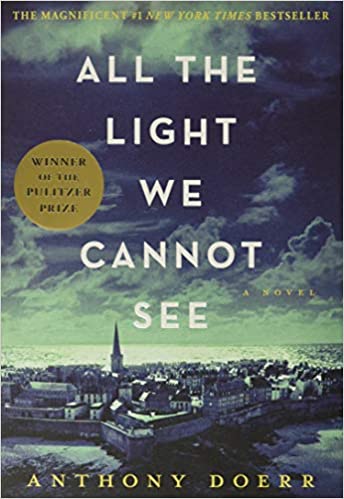
All The Light We Cannot See
World War 2 as you’ve not seen it before
My May book of the month.
Marie-Lauer is blind, having lost her eyesight at age six. Her father is the principal locksmith at the Natural History Museum in Paris, where, it is rumoured, a famous and cursed diamond is hidden away. Her father is also a gifted wood worker. He builds his daughter a tiny, scale model of their neighbourhood, and over time Marie-Lauer learns to use it to find her way around. She spends her days with her father at the museum, where she becomes entranced with molluscs. Her world is narrow, secure, and she expects it to last forever.
Werner and his sister Jutta live in a small orphanage in the highly industrialised town of Zollverein, near Essen. His father was killed in a mining accident, and mining is the life Werner is destined for. One day he stumbles on a discarded radio, in pieces, and over many months puts it together again. He becomes known as the boy who can repair any radio, and his talent for engineering might be his way out of the mines.
When the second world war arrives, Marie-Laure and her father flee Paris, carrying with them a very special secret. Or perhaps what they carry is simply one of its copies. Unable to contact those who were to take the diamond from them, they retreat to St Malo where her father’s uncle Etienne lives – a man who has not left his house since returning from the first world war.
The war has a different beginning for Werner who, at age 14, attends a National Political Institute of Education, essentially a training school for German soldiers. When his talent for radio is discovered, he is taken up by one of the teachers who is working on means to find hidden radios. Werner’s war will not be as a fighting soldier, but it will be front line.
I loved this book for many reasons. The historical detail alone makes it worth reading, bringing the reader samples of the small bites of personal tragedy which together made up the overall horror. ‘Personal’ is probably the best way to describe the whole reading experience – from the bombing of St Malo seen and heard from Werner’s perspective, to the scenes where the villain, Volkheimer (and what a great villain he is) is in the house with a terrified Marie-Laure who still has to pee and drink, unable to see where he is. I lived these experiences – and all the others – with them both, generally with my heart in my mouth.
The writing is rich, but understated, with exquisite imagery. I could read Doerr just for that, whatever tale he’s telling.
And the characters … What a range, and how well Doerr brings their hidden and not-so-hidden angsts, prejudices, and motives to life. And how delicately, action by action, thought by thought, he gives courage to those who need it, with love the greatest stimulus, especially Uncle Etienne. Secondary characters such as Jutta, Frau Elena, and Werner’s unhappy school mate, Frederick, are as vivid as the main protagonists. They simply have smaller, but crucial, parts to play.
The story itself is cleverly told. It goes back and forth in time, which adds to the curiosity as events happen for which explanations only come later. Keeps you reading! Then there are the small crossovers between the protagonists’ lives which bring them closer together, although only in the reader’s eyes. I have to say, during my wait for Marie-Laure’s and Werner’s lives to physically connect, I imagined all kinds of things, including visions of him as the knight in shining armour and how their futures might look. When it came, the connection was highly emotional, beautiful and not at all what I expected.
Definitely one to read again, and possibly again.
Sign up here for more reviews in my monthly newsletter.
All The Light We Cannot See Anthony Doerr
_________________________________
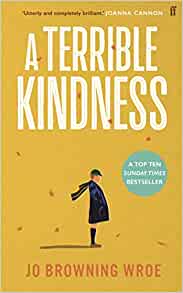
A Terrible Kindness
Lyrical writing
My April book of the month.
Highly lauded in a Facebook book club group where I’ve found the members have similar taste in books to mine, I hesitated to read this novel. It starts with the Aberfan disaster of 1966, in which 140 people – the vast majority of them primary school children – were killed when a slag heap collapsed and cut a deathly swathe through the coal mining village. I remember the news coverage at the time. Did I really want to go there? But other readers assured me it was okay, it moved on … so I took the plunge. And very glad I did so.
William, 18 years old, is a brand new qualified embalmer who volunteers to go to Aberfan in the days following the disaster. He sets out seeing it as an adventure, doing good, using his skills to help people in their time of need. But while he outwardly copes, and earns the respect of his peers and the villagers for his act of ‘terrible kindness’, the brutal horror of it all seeps into his soul, and stays there. William suffers from what we now know as post traumatic stress disorder, with deep and scarring ramifications not only for himself but also his family, and especially his patient and loving wife Gloria.
This isn’t William’s only trauma however, as we discover a little way into the story. There are layers which are gradually peeled back to reveal the scar tissue beneath.
I loved this book for its humanity. William is very much a flawed protagonist. Even before Aberfan, he displays character traits which appear overly sensitive. Through the years which follow the disaster, he must learn that what he does impacts, even blights, the lives of people whom he loves. And, more importantly, that he must actively want to overcome his traumas before he can hope to do so.
There is a wonderful supporting cast. No-nonsense, loving Gloria; William’s Uncle Robert and his life-long ‘friend’, Howard; and William’s school friend Martin, are all brilliant foils to William’s own character and behaviours.
The writing is beautiful, especially the opening chapters which I felt handled the horrors of the disaster with exquisite sensitivity.
Highly recommended.
Sign up here for more reviews in my monthly newsletter.
A Terrible Kindness Jo Browning Wroe
_________________________________
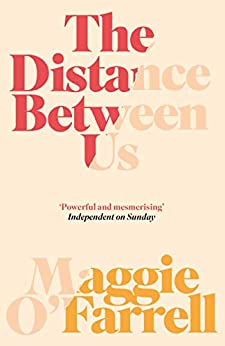
The Distance Between Us
Totally engrossing
My March book of the month.
I apologise for another Maggie O’Farrell book and promise not to read another one for at least a month!
Not a book for the faint-hearted. O’Farrell takes us on a time and place trip which spans decades and continents, with multiple points of view, and sometimes all in the one chapter. You have to keep up. But I always know I’m in safe hands with this writer and it didn’t take long to sort things out.
Jake is British, according to his passport, but grew up in Hong Kong with his English mother. He knows his father’s name is Tom and that he was conceived when his mother travelled briefly with Tom on the hippie trail. Jake’s surname is Kildoune, which his mother tells him is the Scottish town his father came from.
Stella is Italian-Scottish, and grew up in Edinburgh. When we first meet her, she is about to throw in an excellent job as a radio producer in London and head back to Scotland. Not to Edinburgh, but further afield to a place she really shouldn’t go, where she finds work in a fancy hotel called Kildoune.
The complexities of how these two find not only each other but also themselves, is beautifully and cleverly told. It’s the horrific Hong Kong New Year’s Eve crush (which actually happened, in 1993) which sends Jake to England, under sorry circumstances. While there, he makes a spur of the moment decision to search for his father, or at least the town, and heads to Scotland.
The tale is not simply boy meets girl. Stella, and her sister Nina’s, story is a core element of the plot, and has you holding your breath waiting for what seems an inevitable revelation and the reason why this part of the world is important to Stella. Similarly, Jake’s own tale is by no means straightforward, and I wondered just how he would resolve his sticky predicament.
It’s not only the main characters who are beautifully developed, with their deep flaws and issues. The host of secondary characters fascinates too, from sister Nina and their mother’s brilliant friend Evie, to those further in the background such as the parents and grandparents.
As for settings, I don’t know whether O’Farrell visited all these locations, but her descriptions, from Hong Kong to the vast sparseness of rural Scotland, are luscious and evocative.
A book to get involved in, to read late into the night, to feel frustrated over the characters’ actions and, finally, to be appeased.
Sign up here for more reviews in my monthly newsletter.
The Distance Between Us Maggie O’Farrell
_________________________________
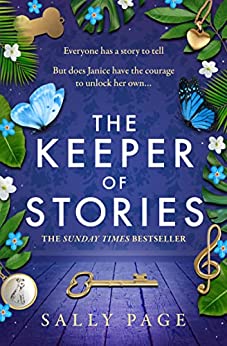
The Keeper of Stories
A modern day fairytale
My February book of the month.
I decided in the end this was really a modern day fairytale. There’s a princess (in the guise of a cleaner) who needs rescuing; a handsome prince to do so (in the guise of a bus driver, including therefore his own ‘golden coach’); a 92-year-old fairy godmother; and a true villain (and a lesser villain, but he’s more an extension of the cleaner’s princess role). When you add in a delightfully full-of-himself fox terrier (aren’t they all?), a child with a broken heart and an assortment of caricature personalities … well, what can go wrong?
Janice enjoys her job as a house cleaner and has made many friends along the way. She also collects stories, mostly true, about her customers or the people she meets on the bus. She keeps these as an indexed collection in her head, bringing them out to suit her mood or the occasion. If asked, Janice denies that she has her own story. While she knows this is not strictly true, her own story is one she doesn’t want to think about.
Janice could be content, if not happy, except for her self-important husband – one of those types who know how the world should be run and don’t mind telling their superiors and betters what they’re doing wrong. He moves from job to job, spending Janice’s hard-earned savings on various projects and down the pub where he is sociable and well-liked. The other minor irritation in Janice’s life is one of her customers – a couple where the husband is also self-important, but rich and arrogant with it. Janice hangs on here because of the aforesaid fox terrier, which she is paid to walk and which loves her as she does him.
Everything changes, however, when Mr NoNoNotKnow (as she calls him) sends Janice off to clean for his aged mother, living in an ancient and rather wonderful-sounding house built into the walls of an Oxford college. He has motives, nefarious naturally, but he sadly underestimates Mother, and Janice.
I very much enjoyed this tale, rooted for Janice from the get-go, and followed the tale of her self-redemption and the way in which, in the end, she rescues herself, and is rewarded accordingly, with much delight. She deserved her happy ever after if anyone did.
The author brings characters and settings to life, and the layered nature of the story with its tales within tales, and the way in which bits of the past are brought to light, is skilfully done. I would certainly read more of Sally Page (and have done so with The Secrets of Flowers).
And how did I come to realise this is a fairytale? You’ll understand when you get to the last few paragraphs.
Sign up here for more reviews in my monthly newsletter.
The Keeper of Stories Sally Page
_________________________________
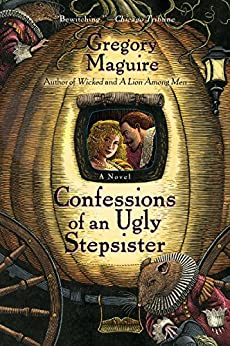
Confessions of an Ugly Stepsister
Enjoyable but not unforgettable
I found this when unpacking our books, and had no memory of it (no change there then) so put it aside with a handful of similar others I’d come across. When I started reading it, some faint bells rang but I kept on reading and mostly enjoying this twisting and twisted tale.
Based, pretty loosely, on the Cinderella story and set in 17th c Holland, Confessions tells the story of plain Iris, her deaf and dumb sister Ruth, and their beautiful but withdrawn stepsister, Clara. Clara has an obsession that she is a changeling. She has dim memories of some trauma from her past which means she hates to go beyond the house, devoting herself to the kitchen instead. The intelligent, responsible and self aware Iris knows she’s unlikely to make a good marriage. She finds contentment however in her role working side by side with Caspar, the good-hearted apprentice to the local artist who took in Iris, her mother and her sister when they fled England following murder of the girls’ father.
Unlike the fairytale, these three sisters are devoted to each other but at the end of the day this devotion is sorely tested, and in my mind found wanting.
What I enjoyed about this story was the slightly florid writing and the wonderful descriptions of the houses, the town, and the surrounding countryside. Iris is a sympathetic character and I liked her very much. Clara I wanted to shake, and Ruth I wanted to protect. The other characters are lively and well written, especially the pragmatic but not unloving mother, Margarethe. As in all good fairytales there are also outright villains and heroes, and found myself wondering just who was the prince – or perhaps the would-be prince – in this tale. The real one is by no means the only contender.
The story itself I found somewhat disjointed, with bits that didn’t seem to fit, as if the author had written them, loved them, and couldn’t bring himself to ‘kill his darlings’. And then there’s the ending, which, to be frank, was wholly unsatisfactory. We are told the outcomes for each of the characters in an epilogue, which would be fine if it didn’t also cover the key relationship of Iris and Caspar. It also contains one of those ‘surprises’ which appear to be there for the sake of it and not because they fit the story.
Nevertheless, Confessions was a pleasurable and entertaining read, although I won’t be tempted to seek out more of his books.
For more reviews in future newsletters – sign up here.
Confessions of an Ugly Stepsister Gregory Maguire
_________________________________
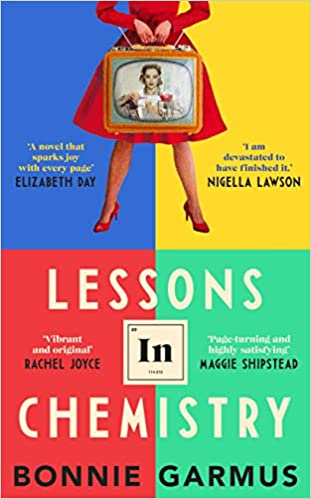
Lessons in Chemistry
Poignant, funny, heart breaking. Be prepared for them all.
I was planning on reviewing books I’ve read earlier this month but I couldn’t quite get up the same enthusiasm as I have for Bonnie Garmus’ debut (and so far only) novel. For once, a highly popular book has lived up to its reputation, which is cause for celebration. Having seen it lauded by many people on one of the Facebook reading groups I loiter in, I took the plunge when I found it in our Forest Books and Crafts shop.
Elizabeth Zott is an angry young woman, but while she takes no prisoners, the 1950s male-dominated worlds of academic and then research chemistry prove impossible bastions to overcome. We know the drill – subject to leers (and much much worse), to condescension, to suggestions she should find herself a husband and be a proper woman, to having her original and brilliant work blatantly stolen. All of the above happens to Elizabeth. Through it all, she keeps her head high and her dignity and keeps on striving in the naive belief that one day, she will be valued for her mind and not her beautiful face.
Then we have the Nobel Prize nominated but, let’s face it, a little socially retarded, Calvin Evans. Calvin suffered a series of tragedies as a small child which meant he grew up in an orphanage. He might have accepted this, given an unknown sponsor provides the orphanage with an unlimited supply of scientific texts and equipment. But then Calvin discovers the source of the largesse and, with it, his ability to hold a grudge.
When Calvin meets Elizabeth, they fall deeply, seriously in love. But it’s not to last (no spoilers) and Elizabeth finds herself unemployed, and a single mother struggling to make ends meet. Then a unique opportunity presents itself.
Others had promised a laugh out loud experience reading Lessons in Chemistry, and the promise was fulfilled. Yet there is a great deal not to laugh about. There’s tragedy, and misunderstandings and truly nauseating people appear to be forever ‘winning’. I have to admit to getting misty eyed reading the scene where a housewife doing her expected role declares she wanted to be a heart surgeon, thinking of all the wasted talent that has ever been and how much better the world might be if that talent had been allowed to bloom. But there is also kindness and morality of the highest order, there’s redemption, and there’s the most wonderful dog in literature. The kid’s cute but the dog wins on adorability, paws down.
While Lessons in Chemistry deals with real issues of the time (many of which sadly still exist), I came to view it as a fable, a fairytale. Each and every character is an extreme version of ‘the type’, including Elizabeth. As one reviewer put it, her attitudes are very 21st century which is why, of course, she is at odds with the world of the 1950s. And the convoluted plot has its good share of evil schemes where the deserving hero/heroine are kept from their birth right by the outright wicked plotting of those who should know better.
Bonnie Garmus’ fascinating background makes her unique to write this tale. Poignant, funny, heart breaking. Be prepared for them all.
For more reviews in future newsletters – sign up here.
Lessons in Chemistry Bonnie Garmus
_________________________________
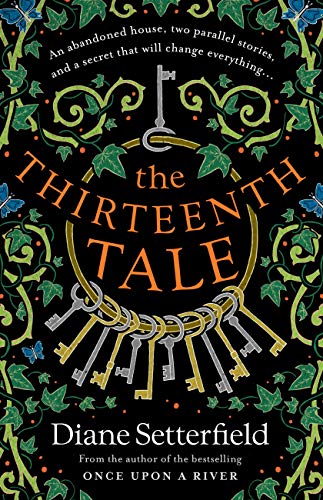
The Thirteenth Tale
All children mythologize their birth. It is a universal trait.
Margaret Lea is content with her life, working with her father in his rare and antique books shop and living in the flat above the shop. She has no friends, and a strained relationship with her mother, but she and her father get on very well. She does, however, carry a burden of knowledge within her which she cannot talk about with anyone.
Margaret dabbles in writing biographies of historical figures, dead people only. So her reaction to receiving a letter from Vida Winter – perhaps the greatest living writer of the time – inviting her to write Winter’s biography is not only something of a surprise but a task she is not sure she wishes to undertake. Winter has never shied from the limelight and willingly tells fans and interviewers the story of her own life, except it is a different one each time. Now, ill with a terminal disease, she plans to tell the truth and has chosen Margaret as her means.
Unlike the rest of the planet, Margaret has not read Winter’s books until she is considering taking on the assignment. When she then discovers the missing ‘Thirteenth Tale’, she is motivated to discover what this mysterious, and possibly truthful tale, is about. So she goes to Winter, listens and transcribes what she is being told is the truth, checks what she can. And in the process she discovers not only Winter’s truths but her own, and others as well.
This book has a definite heavy Gothic vibe to it, and put me in mind of Du Maurier’s Rebecca. The comparison is possibly influenced by the large presence of a house, although very different houses. The descriptions of Vida Winter’s childhood home, Angelfield House – both when it was lived in and in the present day as a ruin about to be demolished – and the goings on there are vivid, dark and chilling. Not a place I would ever have wanted to visit or a family I would want to meet. Passions run high and the characters are extremes of themselves, including the housekeeper and gardener who try to keep the deteriorating place together and are the custodians of the biggest secret of Angelfield House.
As a protagonist, I found Margaret Lea of medium interest until near the end of the book. Her own story is a pale reflection of the drama and tragedy which went on in Angelfield House, yet ultimately it is her thinking and her actions which bring redemption for herself, for Winter, and for the unlikely romantic hero Aurelius. (I loved Aurelius, with his deep melancholy hidden behind a practical, charmingly old-fashioned and optimistic exterior.)
Setterfield carefully unwinds her various plot lines and braids them into one climactic tale with huge skill, and a complex, multi-layered tale it is. This is a book to be read slowly, to take it in piece by piece, and enjoy the immersion into what is almost a fairy tale.
For more reviews in future newsletters – sign up here.
The Thirteenth Tale Diane Setterfield
_________________________________
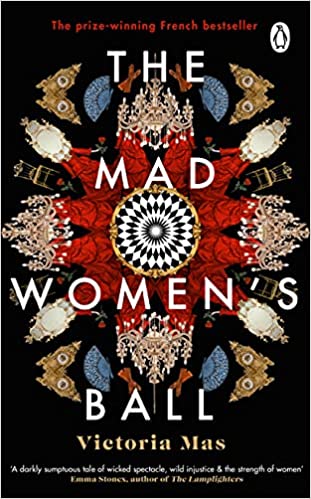
The Mad Women’s Ball
Critically acclaimed … but …
Eugenie is the daughter of a well-off and typical late 19th century Paris bourgeois family, where the father rules the roost. Eugenie would like to experience more of life but when she does so, it’s not quite as she wanted. She has a secret, that she can see and talk with ghosts, which she knows she can never share because if she does, she will be deemed mad and sent to the infamous Salpêtrière asylum. But in a moment of what can only be considered true madness, she spills the beans to her loving grandmere, who immediately tells the father. Sure enough, Eugenie is taken from the house and forcibly deposited at the asylum.
In charge of the nursing staff is the formidable and loyal employee Genevieve, with her deeply buried griefs which she keeps in a box under her bed. But when Eugenie and Genevieve’s paths cross, that loyalty is tested with results which have life-changing outcomes for both women.
I was attracted to the book because of the concept and the setting. But it disappointed in so many ways. I couldn’t get close to the characters to feel for them, even when Eugenie was taken away to the asylum. I don’t believe the author explored enough of the horror of Salpêtrière, which, frankly, came across as not much worse than an old-fashioned English boarding school. The writing was ordinary (with frequent distracting head-hopping), and the ending was plain dull. A kind of ‘and with one leap, Jack was free’.
For me, a good word to describe this book is ‘shallow’. A crying shame because there were so many fascinating seams to mine – Genevieve’s past, the women in the asylum, Dr Charcot’s practise of showing off his mad women, the brother’s angst and how that might play out against the domineering father; Eugenie’s own ambitions etc etc- that in the hands of a less perfunctory writer it could have been both bigger and truly brilliant.
Once again, I find myself disappointed by a best seller, and judging by reviews, I’m not the only one. Why do these books rise to the top of the pile when there are so many better ones out there. Anyone have a view?
For more reviews in future newsletters – sign up here.
The Mad Women’s Ball Victoria Mas
_________________________________
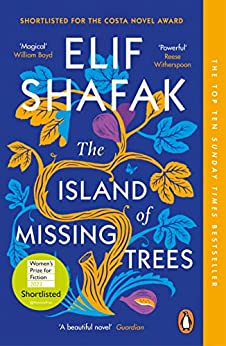
The Island of Missing Trees
An epic tale about love, grief and memory set in Cyprus and London between 1974 and the late 2010s. Spectator review
Shortlisted for the Women’s Prize for Fiction 2022, this is the first Shafak I’ve read. I’m not sure I’ll read another, but I might, if I carefully check the themes first. Because if you want an escapist, uplifting read, don’t go here. If you want to bury yourself in the emotional turmoil of an island divided, at war with itself in the normal agonising, heartbreaking way of these things, and how this destroys the lives of its people, then go ahead.
There is an enormous amount of information – botanical, zoological, cultural and historical – within the pages of this book, and Shafak manages to convey it in beautiful prose without it (mostly) seeming like a school lesson. I have to confess I knew nothing, or had forgotten what little I did know, about the ‘Cyprus problem’ and EOKA and the horrors that went with it. In this respect, the book is no different to those which use the world wars and any other political upheaval as backdrops. However, the passion with which Shafak writes, and especially the vivid detail of her scene setting, brings it alive to carry the reader along on the author’s emotional journey, and hence to suffer alongside her. There is little that is uplifting in the story, even the fictional bits, and I believe the author is trying to get too many messages across. They’re all good messages, around the big themes of tolerance and treating the earth with respect, but her constant hammering away left me, frankly, depressed.
The story superficially is a crossed-lovers tale featuring Kostas, a Greek Cypriot, and Defne, a Turkish Cypriot. But I suspect they are not the main protagonists. Kostas in particular appears to change very little over the years and the course of the story. Defne, does, to a point, and then stops. Rather, I suspect the key character is Ada, their teenage daughter (the late 2010s), whose journey is illuminated for the reader through the interesting means of a philosophical, highly erudite fig tree (and the best character in the book). The strong narrator presence throughout hampered my efforts to really relate to the characters, but it’s less intrusive with Ada. Which is why I would choose to see this as her story, with all the rest showing the reader how genetic memory shapes our personalities, for good and bad.
For more reviews in future newsletters – sign up here.
The Island of Missing Trees Elif Shafak
_________________________________
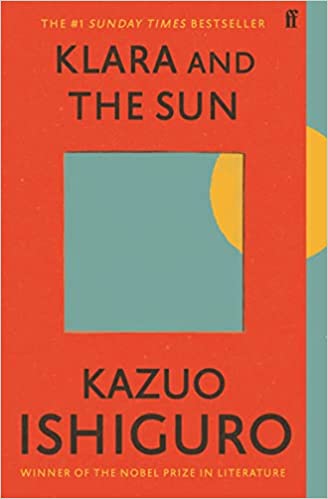
Klara and the Sun
A beautiful and disturbing read.
Klara, an Artificial Friend (AF), sits in the store with others of her kind waiting for a child to choose her to be their companion. When Josie chooses Klara above other, more modern AFs, Klara is very happy and determines to care for Josie in every way she can. But Josie suffers a debilitating, life-threatening illness, and Klara’s determination is soon put to the test when she seeks out ways the doctors and grown-ups haven’t thought of to cure her human friend.
Klara’s touching belief in the all-powerful and healing nature of the Sun [sic] is the cornerstone of her sought-for cure. Her search for how to gain the Sun’s attention, and a promise to cure Josie as he once cured Beggar Man and his Dog outside the store, is carried out in a sweetly innocent manner. Along the way, Klara convinces AF sceptics Rick – Josie’s neighbour, potential boyfriend and someone who doesn’t fit into normal Society – and also Josie’s father (another stranger to Society) to give her what help they can, despite not knowing the details of her plan.
The reader is kept ever mindful that Klara is a robot: there is a lot of capitalisation in her speech, eg the Mother, the Open Plan, etc; she refers to people in the third person when speaking to them; does not participate in meals; and does things like stand facing the refrigerator to give the humans ‘privacy’. Nevertheless, her speech, behaviours and thought processes led me to thinking of her as much like a bright child, albeit a Pollyanna who sees the good in everyone and everything. Even when directly told someone is ‘not nice’, Klara takes the information on board with no judgement. It was these childlike qualities which made the last few pages of the book very hard to read (confession: moist eyes).
The story is written in a measured prose which perfectly matches the character of Klara, and in simple language which, without long description, allows the workings of this brave new world in progress, to emerge over time. Exquisitely paced, you are allowed to be curious for just long enough before the answer to your curiosity is given. Beautiful writing.
I said above that the blurb insists the book is about love, and the quote from the Observer talks about making us ‘feel afresh the beauty and fragility of our humanity’. Personally, I would reverse this, with the book making me quite ashamed of my humanity. That, however, you will need to decide for yourself. Do read it. Let me know!
For more reviews in future newsletters – sign up here.
Klara and the Sun Kazuo Ishiguro
_________________________________
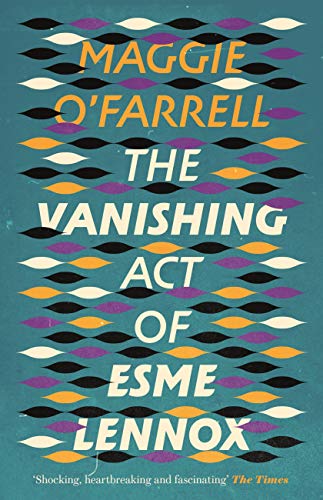
The Vanishing Act of Esme Lennox
‘Demur – and you’re straightaway dangerous – and handled with a chain.’
O’Farrell quotes this line along with the rest of Emily Dickinson’s poem at the beginning of the novel, and it is, sadly, an accurate summation.
We meet Esme first, daydreaming of two girls at a dance many decades in the past. Then we come to Iris, a young woman of today who is about to discover that Esme is the great-aunt she never knew existed, and who has been locked away in a psychiatric hospital for the past 60 years.
The only person Iris can ask ‘why’ is her grandmother Kitty, Esme’s sister, but Kitty is in a care home with dementia.
Over the course of the story, Iris slowly teases out the truth of what happened to Esme and why she was deliberately forgotten by her family. On the surface, it appears to be one of those tales of upper class women who refused to conform to societal norms – including things such as a preference for books over men and marriage, one of Esme’s great faults – so were put away to avoid family embarrassment. So easy to do, so easy to forget them. In this case, however, something darker may or may not be going on.
O’Farrell’s writing is always exquisite with settings, whether it be colonial India or 1930s Edinburgh, which are vividly described with a few pen strokes. Her characters are vivid too, painted with such insights you quickly believe you understand them and what makes them tick. And you may or may not be right. I loved Esme, as a small girl, a traumatised teen and a composed old woman. Iris too is a highly relatable character, including her rather messed up relationship with Alex, her ‘brother’.
O’Farrell is also a master of mystery, dropping hints along the way, keeping the reader turning the pages until it’s all worked through. What I especially admire is the way she expects her readers to solve the mystery by the end of the book, and there is no need for her to ‘wrap up’ by explaining it all. As she does with The Hand that First Held Mine, and indeed with Hamnet.
Read this book for the language, read it to grieve for the lost life of Esme Lennox, and read it to keep you intrigued. But do read it.
For more reviews in future newsletters – sign up here.
The Vanishing Act of Esme Lennox Maggie O’Farrell
_________________________________
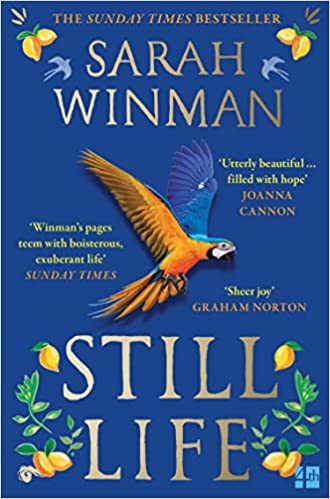
Still Life
‘Two people pulling each other into salvation is the only theme I find worthwhile.’
This quote from EM Forster admirably sums up this beautiful book.
Towards the end of WW2 Ulyssses, a young English soldier, and Evelyn, a bit more than middle-aged art historian seeking to save lost treasures, meet by chance in Tuscany. He gives her a lift to where his unit is stationed, helping themselves to the remains of a wrecked wine cellar. When the bombs go off (which shouldn’t at that stage), they are forced to stay the night and in that time forge a bond of friendship based on art.
Their lives take very different paths thereafter. Ulysses returns to the East End of London to discover his wife, Peg, has had a child in the several years since he last saw her, and wants a divorce so she’s ready to emigrate to the States as soon as her US army lover returns to reclaim her. Ulysses is heartbroken but stoic.
On his journey back from Italy, Ulysses had saved an old Italian gentleman from suicide, and when, several years later, the gentleman dies (of natural causes!), Ulysses is surprised to find he’s been willed his estate. This includes the sizeable house in Florence where Ulysses and the gentleman met.
Thus begins a whole new episode in Ulysses’ life, taking his ex-wife’s daughter and a lifelong friend to live in Florence where they turn the house into a pensione.
Meanwhile, Evelyn is busy continuing her career as an authority and lecturer in Fine Arts, and intermittently bringing us memories of her first great love – an Italian maid in a hotel where she stayed around the turn of the century.
Will their paths cross again? There are close encounters, but it takes a great deal of complexity of inter-relationships for it to finally happen, decades after that first encounter. In the meantime, the ups and downs of Ulysses’ life and of those close to him kept me totally fascinated.
I loved this book for its exquisite writing, its extreme characters and its mystical quality, including a talking tree (two actually) and a very articulate parrot. Ulysses is the even-tempered person who holds it all together. Peg bruises her way through life, the centre of attention, a total drama queen, but I had to love her. The damaged Cress, seeking acceptance and love, plucks at your heart. The ‘kid’, who grows up in Florence knowing her mother gave her away, has her own issues too.
For me, Still Life was more fairytale than real life. I swam through the pages, letting the high falutin’ talk of art and literature (of which I have to confess I was mostly ignorant) serve as a rich tapestried background to the characters’ stories over the decades.
A ‘will read again’, for sure! Maybe this time I’ll stop to look up some of those art references.
For more reviews in future newsletters – sign up here.
Still Life Sarah Winman
_________________________________
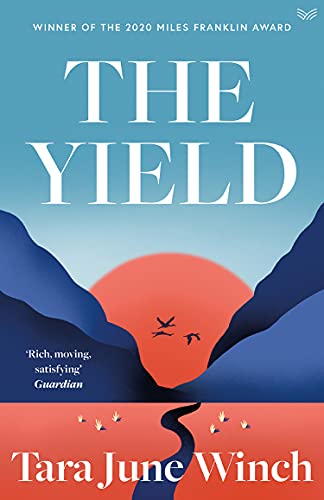
The Yield
‘…a time when the air was as clean as the time before the words clean and dirty had ever been imagined.’
I bought this book (which won a prestigious Australian literature prize) as the blurb promised a good tale of taking on a nasty mining company and, hopefully, winning the day. What I found inside the covers was very different.
The story is told from three perspectives.
August Gondiwindi and her sister Jedda were raised by their grandparents on a former Aboriginal mission station turned wheat farm, Prosperous House. A happy childhood, with loving, involved grandparents. But when Jedda disappears when the girls are about ten and twelve, August’s world shatters. In her late teens she moves away, ending up in London in a meaningless job and letting time slip by with no real purpose. Now, after ten years, she has returned for her grandfather’s funeral, planning to go back to London once it is all over.
Albert Gondiwindi, the grandfather, is seen through the dictionary of Aboriginal words he is compiling, with telling commentary alongside.
Finally, there is Rev Ferdinand Greenleaf, who founded the mission in the late 19th century While imprisoned during WW1 because of his German origins, he writes a long letter to the British Society of Ethnography setting out the horrific history of Prosperous House and begging the authorities for intervention to prevent the continuing atrocities and destruction of Aboriginal culture.
The basis of the story is the age-old classic of a lost soul (August) coming to terms with their past and finding themselves through a cause which they realise means everything to them. I found August’s story the least interesting.
For me there was more depth in Greenleaf’s tale. His heart-rending and horrific account of white treatment of Aboriginals is a well known one, now. Most people are also aware that it was the well-intentioned as well as the downright murderous brutality which warped and largely destroyed the lives of generations after European settlement. The reverend’s spiritual struggle and his eventual reluctant acceptance that perhaps there is no difference between his god and the local god(s) made me feel for his 19th century angst, while understanding August’s dismissal of him for what he had helped to destroy.
The key strength was in Albert’s dictionary (long-winded though it is at times!), where the teachings of his ancestors and the descriptions of Aboriginal life and lore revealed a rich depth of civilisation which most people, so very, very sadly, would hardly be aware of even today. An amazing culture, so aligned with the land and the river. As Albert says, ‘before the words clean and dirty had ever been imagined.’
Having said all that, I have one major issue with this publication. Given it’s a book about colonial supremacy I can’t imagine how the publishers and the author missed the irony of using American spelling and grammar in a book about Australia published in the UK. I nearly stopped reading at that point.
A recommended read for its educational value rather than entertainment.
The Yield Tara June Winch
_________________________________
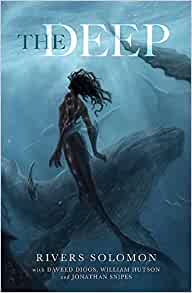
The Deep
‘It was like dreaming‘
This novella arrived in the post, sent by a friend with a note simply saying I might find it interesting. My friend was correct. Not only interesting, but fascinating, especially given my current project is a magical realism novel which I feel The Deep is, although apparently it’s classified as science fiction.
Using the horrific historical fact that ships’ captains threw pregnant African slaves overboard, Solomon builds a world of mermaid-like beings who have evolved from the foetuses born underwater and initially nursed by whales. Wow. An idea and a half!
Once a year these people, known as the Wajinru, gather in their thousands for the Remembrance, presided over by the historian, who holds the sum of all the historic memories of the race within them. At the Remembrance the historian shares these memories so the Wajinru can remember also, albeit briefly. For afterwards, the historian takes them back into themselves, leaving the people to live a carefree life unburdened by the past.
Yetu has been the historian since she was 14 years old and after some 20 years, the weight of all this history weighs heavily on her. She wants to be herself, not the sum of her people’s past with her own identity fading into nothingness. Almost on a whim, she abandons her people in the middle of a Remembrance and swims away and up to the surface in a bid to save herself. What she discovers when she washes up on an island inhabited by ‘two legs’ is, eventually, freedom indeed, but not how she imagined it.
There are many things to enjoy about this novella. Solomon’s evocation of the deep sea, its dangers and wonders, and of the Wajinru themselves, is beautifully written. An almost mystical setting with some wonderfully pragmatic characters such as Yetu’s amaba, mother. All the characters are robust, even the minor ones. Yetu herself is a complex individual, bright, troubled, torn between her love of and duty to her people and her desire to live a life of her own. Oori, the ‘two legs’ who helps Yetu when she is first cast onto the island, is brilliantly depicted with her self-isolation, pride, deep hurt at her losses, and her fears. The gentle to and fro of Oori and Yetu’s developing relationship swells and subsides like the ocean waves, carrying the reader along to its unexpected and satisfying conclusion.
A highly worthwhile read.
The Hugo Award for Best Novella 2020
Nebula Award for Best Novella 2020
The Deep Rivers Solomon
_________________________________
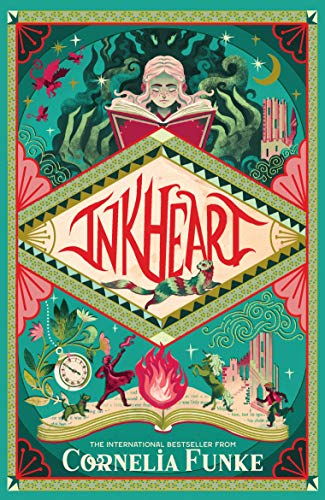
Inkheart
Dare to read it aloud
I’m late to the party on this one, but I hadn’t heard of this book/series until I was searching for something to give to a keen young reader who enjoyed my Guardians of the Forest series (clever lad!). I was impressed by the several thousand reviews and bought a copy for myself as well
Meggie knows her mother isn’t dead, only that she is away, apparently having adventures but for some reason unable to return to her family just yet. Meggie doesn’t mind too much as she is content with her father, Mo’s, company. Mo loves books and repairs them for a living. Piles of books are to be found all over the house and both Mo and Meggie enjoy nothing better than having their noses in a good story. Meggie even has her own book box to house her favourite tales. But one thing Mo won’t do is read out loud, even to his daughter. One day, Meggie discovers why.
She also discovers why they have moved so often. For Mo is a wanted man. Not for any criminal action on his part, but by an evil, terrifying character called Capricorn, whom Mo read out of a story many years before. When Capricorn finally catches up with Mo, Meggie must deal with terrifying adventures in real life, not just through the pages of a book.
I found Inkheart fascinating given it’s written for children. Or at least it has a twelve-year-old protagonist. Each chapter is headed with very adult snippets from famous books. The expected ones are there: Narnia, Wind in the Willows etc. So is Fahrenheit 41. Make what you will of that. Much of the tale is very dark, such as the scenes in the red church, and some truly nasty atrocities are implied. Now I don’t feel nearly so bad about my monstrous creatures ravaging the Madach farmlands in Legend of the Winged Lion. What is fascinating is how the main (of this world) characters grapple with the storybook-style good vs evil reality which Mo set loose.
In contrast to (most of) the ‘baddies’ the of this world characters are complex and three dimensional. Mo’s struggle to protect Meggie, his heartbreak over his wife, and his not very inspired attempts to put things right are very human. No superhero dad here. Elinor is the kind of character we might expect in a story to never be afraid, yet she is. Furious and afraid.
As for Meggie, she learns a lot about herself, those closest to her, and the world at large. Vividly written and fast moving, I didn’t notice the extraordinary length of the book (543 pages), and can well understand it’s mass following.
PS They made the film in 2008, which has of course had mixed reviews from the book fans. I must track it down. Helen Mirren would be, I suspect, a more elegant Elinor than I had pictured but Brendan Fraser as Mo? I’m in!
Inkheart Cornelia Funke
_________________________________
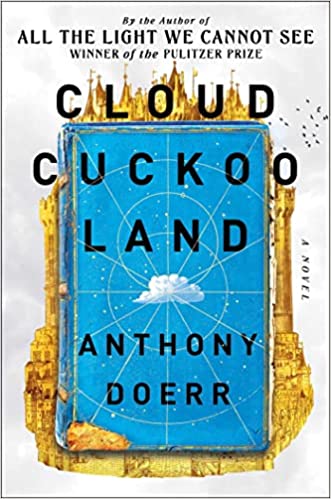
Cloud Cuckoo Land
February’s book is something altogether different and an extraordinary read.
I haven’t read All the Light We Cannot See, but it’s most certainly on my list now, as I’m told it’s even better than Cloud Cuckoo Land.
Five characters in different places and times, but each of them outcasts in their way, are bound together by the tale of Aethon, a story supposedly told by Diogenes about a Greek shepherd who aspires to find Cloud Cuckoo Land. For there is a land of milk and honey where no one is cold or hungry, and all are accepted for what they are.
There’s Konstance, 14 years old and alone in a space ship carrying humanity’s remnants on a 500 year plus journey to a new earth, the original having been destroyed by said humanity. Konstance is shown the Atlas in the Library and becomes obsessed with walking the dead earth’s images, exploring and longing for a world she has never known in reality.
We have Anna, a young seamstress in Constantinople at the time of the Ottoman siege and eventual victory. With no talent for sewing and a dying sister to care for, Anna and her sister find comfort in Aethon’s story when she rescues the frail, aged and largely illegible text from an old priory.
Omeir – how my heart went out to Omeir, my favourite of these characters – with his hare lip and his young, loved and cared for oxen. And his grandfather’s wisdom to guide him through the nightmare when he and his oxen are recruited into the Ottoman army and are present at the siege.
Then Zeno, 86 years old, having more or less worked out his difficult life and now content translating Aethon’s tale and sharing its joys with a group of ten-year-olds – until he discovers there’s one more thing he needs to do make life complete.
And finally we have Seymour. I of course immediately loathed Seymour, but as his story unfolded he became my second favourite character. Trustyfriend the owl broke my heart. Living in a Forest which has had to battle for its survival several times over the centuries, my empathies for Seymour were high, I’m afraid.
The various ways the stories weave their threads into the cloth of Aethon’s tale, the interconnections, the symbols, the sheer humanity of the players, drew me in entirely.
Definitely a book to read at least once more, to get into the little bits, and go, Yes, of course, and feel smug about knowing what that previously obscure section is about.
Loved it.
Cloud Cuckoo Land, Anthony Doerr
_________________________________
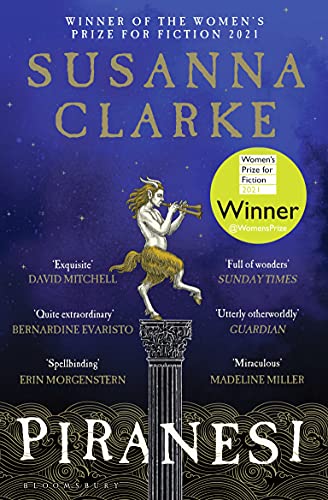
Piranesi
My review book for my January newsletter won the Women’s Prize in 2021 and is an international best seller.
‘I am the great scholar, the magician, the adept, who is doing the experiment. Of course I need subjects to do it on.’ CS Lewis, The Magician’s Nephew’
Clarke quotes this at the beginning of her novel, and how very appropriate it is.
Piranesi lives in the House, where he assumes he has always lived. The House provides and he is content, happy. He spends his days exploring and measuring, writing everything up in his Journal. His only human contact is with the Other who visits weekly, carrying a shining device. The Other is, Piranesi believes, his friend.
Odd things begin happening, strange messages are found, the Other warns Piranesi there is an Enemy in the House who would do him harm. The life Piranesi believes is the only life he has known begins to unravel. Whereas once he accepted, now he questions.
I have long been a fan of Jonathan Strange & Mr Norrell. I read it when it first came out several years ago and my lasting impression is of rich, vivid settings, fairytale-like characters and a twisting, fascinating tale.
I should therefore have expected the unexpected when I ordered Piranesi. In fact, I had absolutely no idea what the book was about. From the cover, I thought perhaps it might be yet another Greek myth retelling. So it was with much surprise – and some confusion – that I jumped into Chapter 1 with its details of Moon risings, Vestibules, Halls and Statues (the capitalisations copy the book). However, the telling of the narrator’s life in the World, his exploration of the House, how he organises his days, his Tables and Journals is all so beautifully written that I went with the flow and waited for some clue to what was going on. It’s the kind of story I love, and in this I wasn’t disappointed. Over time the clues were dropped, inklings spotted, and events and motivations clarified.
But for me that was all that happened. I was waiting for the Big Thing, the Surprise, the Twist, but it never came. The mystery unfolded, the revelations piled on revelations, a new character came into play and all was explained.
And that was that, despite a touch of drama.
Worse, for me, the author continued to not only explain what had gone on but carried on with what happened afterwards. I was left feeling a bit So What? and wished that Clarke had left us with some ambiguity to exercise our imaginations.
A highly worthy read all the same.
Piranesi, Susanna Clarke
_________________________________
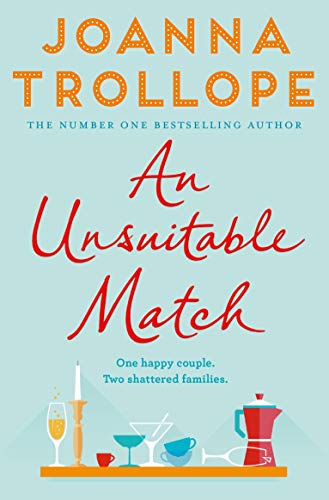
An Unsuitable Match
My review book for my December newsletter is a little lighter than some previous reads. Here’s why I read it and my thoughts.
‘Why on earth, after all you’ve been through, all you’ve survived, all you’ve achieved, why do you want to get married?’
Someone suggested my own book, Keepers, is a Joanna Trollope type of book, so I thought I’d better go read one of hers, having heard of her but not read her. I guess in that this book is about families and their frustrating, moving and complex relationships, the comparison is valid. I’ll let others draw any further comparisons either way.
Rose has always been a good upper middle class wife to her lawyer husband and mother to her children. When he leaves her, in her mid 50s, for a long time mistress and work colleague she is initially devastated. Seven years on, she has her life together again and she’s happy. I’d tend to be happy living in a mews house with garage and garden in central London too, or at least I’d give it a try. Then Tyler walks into her life and sweeps her off her feet. He loved Rose when they were in school, but their paths hadn’t crossed since Tyler moved to New York decades ago. Now, widowed and with a grown daughter, Tyler lets his old love blossom and draws Rose into the romance of it all.
But her three grown children aren’t sure about this. They like the personable Tyler, but they don’t like the way he’s taken their mother’s focus away from them. And when Rose announces they plan to marry, the kids immediately become suspicious of his motives, given that mews house is Rose’s old age pension not to mention their inheritance.
It took me a while to get into this book. I didn’t immediately take to the characters or the situation which seemed a bit too ‘rich’ for us average types. I never took to Tyler who was just too footloose and Peter Pan for my taste. I also found the twins whiny and immature, but I think that was the idea. As for Rose herself, I could sympathise with her dilemma and during the course of the story I came to want the best for her, whatever that was.
An Unsuitable Match is a short read, practical and to the point story telling. Readers of my reviews will know I’m a sucker for deep imagery and beautiful prose, but in this case I was happy to just read the story. Even willing to delay putting out the light until I had finished it (that wasn’t 2 am or anything though).
Will I read more of Joanna Trollope? Maybe, if I happen to stumble on a beachside holiday sometime and I need a truly relaxing read. There IS a reason she’s a best selling author.
An Unsuitable Match, Joanna Trollope
_________________________________
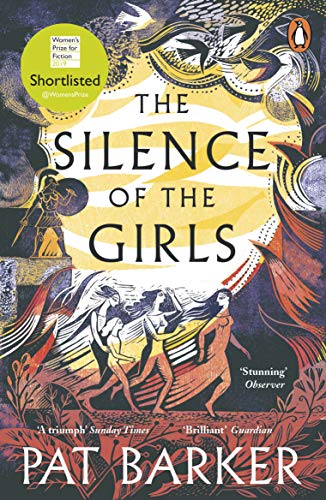
The Silence of the Girls
My review book for my November newsletter is Pat Barker’s The Silence of the Girls.
‘Great Achilles. Brilliant Achilles, shining Achilles … we never called him any of those things; we called him ‘the butcher’.
I hadn’t read any Pat Barker before, but bought this for my daughter’s birthday and when she said she was enjoying it, I bought my own copy. (We live in different countries so sharing is difficult, sadly.)
It’s the time of the Trojan War. From the high citadel where the women of Lyrnessus seek a last refuge, Briseis must watch the slaughter of her husband and brothers as the Greeks break through the walls and take the city. Her sister-in-law throws herself from the tower rather than face capture, but Briseis chooses life despite her terror. As a queen, young and beautiful, she is a true prize and the hated Achilles, who slew her 14 year-old brother, claims her as his trophy from the battle. What follows is the development of a strange relationship, where Briseis remains forever wary of Achilles, who in turn views her with a different kind of wariness – one which is more a reflection of the longing he retains for his sea nymph mother who comes to him out of the sea on moonlit nights. Overlaid on the relationship between the protagonists is Patroclus, Achille’s boyhood friend and implied lover, and a friend to Briseis.
The contrast between the two men is starkly drawn. Patroclus is kind and thoughtful, even to the slave women, where Achilles is entirely self-absorbed. This self-absorption, his unbending ‘honour’, has drastic consequences for Briseis, and, as we know from the legends, tragic consequences for Patroclus.
The story is told from the points of view of both Briseis and Achilles, which – as my daughter pointed out – is odd given the book is meant to give a voice to the girls. That subtlety had passed me by. The pace is swift, there is lots going on, and the reader is painted a vivid description of life in the Greek camp after nine years of war. The scenes really come to life to the point one is grateful not to have been there. However, I found the character depictions less compelling, not really warming to any of them. At the end of the day, their different fates – even Patroclus – left me unmoved.
I’m not quite sure what this book is meant to be about. As a simple retelling of Troy’s most famous hero from the point of view of one who sees him up close but is not close to him, The Silence of the Girls is a good read. But Achille’s story takes over, as even Barker admits in the last lines of the book. Maybe that’s what it’s about – that the self-absorbed men take over and the girls are silenced, but once they are dead and only the ‘good men’ (but a little foolish) are left, can the girls have a voice. Not sure where that leaves us!
I might risk another Pat Barker, but not with such high expectations.
Shortlisted for the Costa Novel 2018 and the Women’s Fiction Prize 2019
The Silence of the Girls Pat Barker
_________________________________
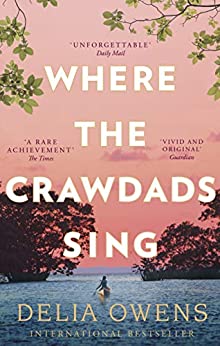
Where the Crawdads Sing
‘Swamp water is still and dark, having swallowed the light in its muddy throat’
I avoided this book for a long time, suspicious as ever of best sellers (and have been recently scarred by that once more – to the extent I took the book to Tesco and left it on the charity table because I was SO fed up). Then a friend whom I trust told me I should get over myself and read Where the Crawdads Sing because the writing is beautiful.
The writing IS beautiful. Absolutely, the writing is beautiful. Despite having to skim, work out from context or ask my US mates, many of the local words (including ‘crawdads’ which I sort of knew but had to check) I found myself sinking into the beautiful writing.
I also found myself loving the omniscient, telling a tale style which is not something us authors are encouraged to do these days. At least, I loved it for a while.
At first, my heart bled for young Kya, abandoned in the marsh. I waited with my stomach in my throat for all kinds of dread things to happen to this little child left so exposed, so isolated. I won’t do spoilers, although I guess there’s no one else left who hasn’t read the book. What I will say, is that by the end of the story I was less emotionally involved with Kya than I was at the beginning. Part of this was because of the omniscient narrator which meant I never got a chance to really get inside Kya’s head, to see and hear and feel her experiences as if I was her.
But a big part of it was because it was a very, very unrealistic plot. From illiterate Marsh Girl to internationally renowned expert without leaving the shack? (Sorry, that’s a spoiler.) Seems rather far-fetched. Perhaps I should have read it as a fairytale. It has a lot in common with Disney princesses.
And then there was the whodunnit. Really, we couldn’t work that one out? Who else could it possibly have been? (No spoiler.)
BUT – a huge BUT– it was every page worth the read. Because the writing IS beautiful, as my friend promised me.
A Number One New York Times Best Seller
Where the Crawdads Sing Delia Owens
_________________________________
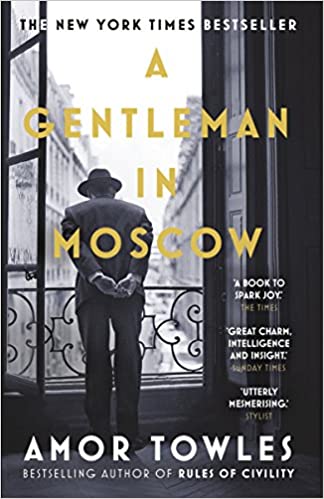
A Gentleman in Moscow
‘Well, where is our purpose now?’
If you had the choice of where to spend decades under house arrest, an elegant hotel should be top of your list. But not for the reasons you might think.
In 1922, Count Rostov, charming member of the Russian aristocracy, is branded a Former Person by the new Bolshevik regime. But a past action of his saves him from being summarily shot. Instead he is taken to the Hotel Metropole and put under permanent house arrest. Not in his former luxurious suite, however, but in a tiny attic room which is to be his home for the next 40 or so years.
The staff – who trip themselves up by referring to him as Your Excellency – are apologetic, while the phlegmatic Rostov sets about making the best of things in an almost British (sorry to the Russians) stoic, stiff upper lip manner. But circumstances change him. While he may be outwardly unemotional, he is also adaptable, and he grows into his very different role with no rancour nor loss of dignity. He adapts so well in fact, finds so much life within the walls of the hotel, that his old and good friend Mishka eventually refers to him as ‘the luckiest man in the world’.
A Gentleman in Moscow is superficially a light read, with much humour. The Count is generally self-deprecating and certainly self-questioning, and the narrator writes of him and the other characters in a kindly humorous manner – a restrained PG Wodehouse, perhaps. Yet these are three dimensional characters, whom the reader can see and hear and sympathise with. Perhaps even the odious Bishop, but others can make that judgement.
Similarly, the setting of what was a violent and grim time in Russia’s history is portrayed in a way I found fascinating. The author’s knowledge of this period, and of Russia’s literary heritage, gives huge authenticity to the story. The use of the occasional footnote to explain certain historical details might seem out of a place in a novel, but they worked, written as they were in the narrator’s style. As for this style? I don’t want to say light hearted, for that would have been insulting to what actually happened. More that the narrator takes every opportunity to poke gentle ridicule at the strength of feelings, at the nonsensical decisions and decrees, and at the way in which human nature of the worst kind eventually undermined what started out as positive and idealistic.
The revolution is the reason Count Rostov is under house arrest in the Metropole, but the fact he can never leave gives the narrator the opportunity to view the next decades as if through a fogged mirror. The world goes by outside in a tumult, with the occasional blast of freezing air making its way through those famous revolving doors. Events impinge on Rostov, certainly, but it’s as if his circumstances protect him from their potential impact. Until they don’t. And when this happens, their force seems more hurtful because of his inability to do a damn thing about any of it. Or perhaps there is something he can do? When he must.
I spent much of the latter half of the book wondering how Rostov’s story might end. All I will say now is that the ending was, for me, perfect.
This is not a book for readers who expect grim tragedy given the setting (although there is tragedy.) It’s also not a fast paced book and it’s long – 460 pp of tiny font (that was a problem I have to say).
This is, however, a book for readers who enjoy humour along with their dose of ‘life’s lessons’. And good writing too. Despite its length, I read it quickly, caught up so thoroughly in Rostov’s story.
Definitely on my ‘read again’ list.
The New York Times Best Seller
A Gentleman in Moscow Amor Towles
_________________________________
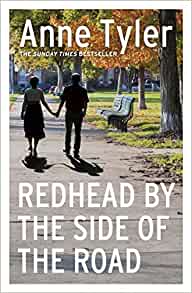
Redhead by the Side of the Road
Great to meet you Anne Tyler!
Micah lives an ordered life, just the way he likes it. He has a routine, he has a job where he calls no man master and his IT illiterate clients are generally respectful and grateful. He also has a girlfriend who fits in as neatly in his routine as Micah’s vacuuming and dishwashing times. He believes himself content.
But then two things happen. The girlfriend tells him she is about to be evicted from her home – Micah is sorry and would like to help but the obvious solution simply evades him. Then the son of his first love, the one from his student days many years ago, turns up claiming to be Michah’s son. In the face of the downright messiness – emotional and physical – of other people’s lives with which Micah now has to deal, his orderliness begins to go out the window. Including the girlfriend. Should he chase his old life, try to recapture it? Or is there another way to contentment?
It’s rare to come across a male lead protagonist in what I would very much call ‘women’s fiction’. There are no crimes or mysteries to solve (in fact the fatherhood mystery is solved instantly and definitively), no plot twists – in fact, there’s no plot at all really. But Micah’s natural kindliness and inability NOT to get involved, endeared him to me from the start. I wanted him to be happy.
This is a short book, which is fine as any longer and I suspect the reader would want to hurry Micah up a bit. As a gently humorous study in human nature, it’s a beautiful read.
This is my first introduction to Anne Tyler and I will be reading more of her work.
Longlisted for the Booker Prize 2020
Redhead by the side of the road Anne Tyler
_________________________________
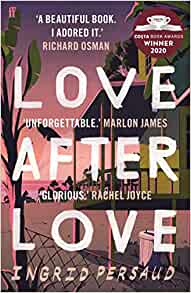
Love after love
Sadly disappointing
The book is set in Trinidad and I was expecting to be fascinated by an unfamiliar setting. In the end, I was more put off as the author appeared to be mostly making fun of the place and the outdated views of its people. Certainly, visiting there is not on my bucket list based on her descriptions!
I love a character driven novel all about people and their mixed up lives and emotions, but I found these characters two dimensional despite the levels of angst each one goes through. When the great happening took place which changed everything, I wasn’t at all upset, especially as it seemed to be there for melodramatic effect. Although it was heavily foreshadowed, I was still taken aback. I was sad not to be affected, as this character was by far the closest thing to someone to root for.
Love after Love confirms my view that I should avoid prize winning books these days. The judges have different criteria than I do for what makes a good read, and I don’t think I’m alone in this view. By the way, leaving out the dialogue marks doesn’t give a book literary merit – it just makes it pretentious.
Love after Love Ingrid Persaud
_________________________________
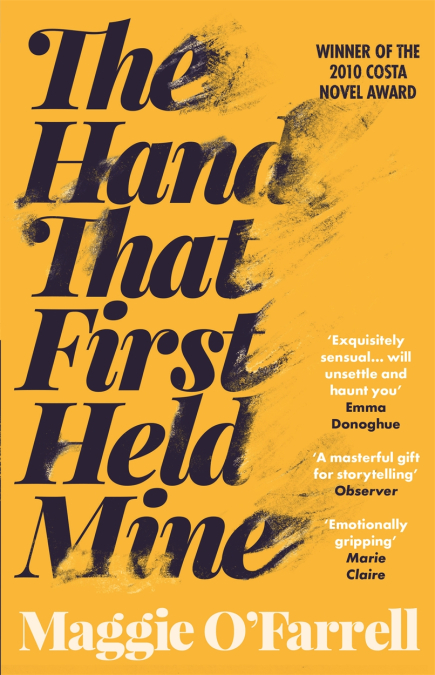
The hand that first held mine
Like Daphne du Maurier…O’Farrell writes books designed to…bring our most primal fears to the surface ― Daily Mail
Forget Hamnet, which I loved (see below). This earlier novel of O’Farrell’s is a beast of a very different nature and why it took me this long to discover it I have no idea. Talk about how to keep the tension high, and such wonderful, alive characters.
In The Hand That First Held Mine, we meet two women, separated by time.
In the 1950s, Lexie is desperate to escape rural Devon, a forever pregnant mother, and a stiflingly boring home life. A chance encounter over the garden hedge introduces her to Innes, London man-about-town, owner of a literary journal housed in Soho, and all-round sophisticate. Shortly afterwards, Lexie packs her suitcase and takes the train to her future. Initially, she stays in a respectable boarding house, but, as the harridan landlady finally announces, she ‘turns’, into ‘one of them’. This is down to Innes, who is several years older and a lifetime more experienced (I won’t say wiser) than Lexie. I can’t say more than that without spoilers.
In today’s London, Elina, a Finn, lives with her boyfriend, Ted. She seems to have had a baby, but she initially wonders how that all came about and while she loves the little chap, her vagueness about his existence is, frankly, terrifying. We learn that Elina had a traumatic birth, nearly died, and that Ted was there to witness the bloody horror of it all. But as Elina recovers, Ted becomes more and more unsettled and withdrawn as deeply buried memories, hints of past events – which seem to have been triggered by the birth of his son – push their way into his consciousness.
This book had me on the edge of my sofa/chair/bed from page one to the last sentence. As the Mail quote says, primal fears around motherhood, loss, and death meant I’m not sure I actually breathed much while reading. The point at which the reader ‘gets’ it is so cleverly done I laughed, a little hysterically.
A total must read.
The Hand that First Held Mine, Maggie O’Farrell
_________________________________
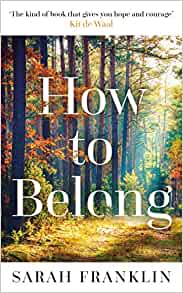
How to Belong
After all, what are any of us ever after but the conviction of belonging.
Wallace Stegner
Franklin quotes the above in the opening pages of the novel, and it sums up perfectly what this story is about.
Two women’s lives merge. Both grew up in the Forest of Dean, both left and both have returned for very personal reasons, seeking comfort and a new way forward. There the comparisons end, as Tess and Jo are in all other ways very different people. Tess has carried a heavy burden since childhood, a burden which has been exacerbated rather than eased by those who should care most for her, her family and especially her mother. Jo has grown up in a loving, supportive environment, encouraged to go far, and that’s what she’s done. But now Tess’s burden has ripped her from the one person who has given her unconditional love and a sense of belonging. And Jo’s self-assurance about belonging here, in the Forest, is slipping away, leaving her unrooted and unhappy.
Living in the Forest as I do, I love the way Franklin captures the soul of the place, the good and the shabby, the people and the trees. It’s not chocolate box, as Jo herself points out to a visiting university friend. It’s very real, however. Against this backdrop, Tess and Jo quickly become real too, their problems become the reader’s problems. There’s no obvious way through, and Franklin sows sufficient doubt to make you wonder how there can be a happy ending, or even if there is. This is Franklin’s second novel, and I’m looking forward to the third.
_________________________________
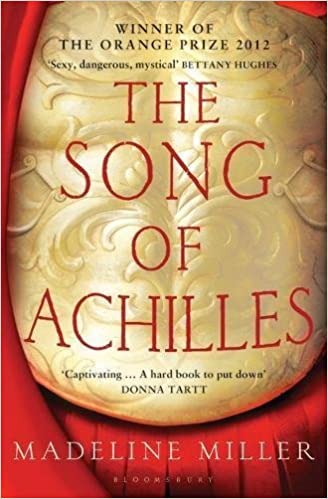
The Song of Achilles
‘Go,’ she says. ‘He waits for you.’
I bought this off the back of Miller’s Circe, which I adored, and while I didn’t love it quite as much, it certainly didn’t disappoint. The young Patroclus, sensitive and trying to do his best, is the awkward kid the big kids pick on, despite his father being the king. When Patroclus accidentally kills a tormentor, he is banished by his father, Menoitios, to live in the household of Achilles’ father, King Peleus. But not before Menoitios has taken the 9-year-old Patroclus to add him to the long list of suitors for the hand of the beautiful Helen of Sparta. Helen chooses Menelaus, but her father demands that all her suitors pledge themselves to come to her aid should the need ever arise. And we all know how that ended.
For reasons young Patroclus never fully understands, the young Achilles takes to him and demands that he be accepted as his own, personal advisor. The two become lovers, and inseparable.
Achilles is destined to be the greatest of the Greek warriors, and despite his sea-nymph mother’s attempts to keep him away from Troy, and Patroclus lack of fighting skills, that is where they end up for ten long years.
Miller tells the story of the soul deep love between Patroclus and Achilles with her usual beautiful imagery, bringing it to life through emotion and words – there’s nothing graphic here, merely sensitively written moving moment after moment. And a true tragedy, as Achilles’ arrogant behaviour finally loses him the one thing he holds dearest. The telling of the role of Briseis, whose family Achilles slays, and who falls in love with Patroclus, provides a sombre counterpoint, a ‘what if’ possibility, as well as being key to the whole sorry ending. A highly worthwhile read.
Winner of the Orange Prize 2012
The Song of Achilles Madeleine Miller
_________________________________
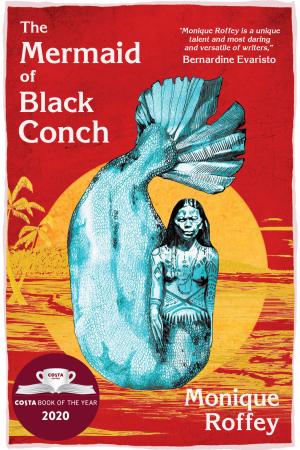
The Mermaid of Black Conch
I was a human woman once … some thousand cycles past
Normally I shy away from best sellers as the marketing hype doesn’t always correlate to my own view of a good read. However, a different take on mermaids seemed a good bet and I wasn’t disappointed.
Laid back, easy-going David discovers he’s not singing simply for himself out there in his pirogue on the sunlit Caribbean seas. Someone who’s been in the ocean for a very, very long time is drawn to his voice, and to him. The feeling is mutual, but she’s a mermaid and he’s a human. Then the Americans come to the island, and in an epic battle they catch more than they bargained for. The macho dad is thrilled – after a lifetime of not quite getting where he always saw himself, this is his chance for fame and fortune. The poet son is uneasy but goes along with dad, who’s trying to toughen the young man up. Fame and fortune elude dad once more however, when David rescues the mermaid and manages to get her to his house where he installs her in a bathtub. His plan is simple – hide her until the Americans leave and then return her to the sea. Only, it turns out this can’t happen.
This is a lyrical book, and mystical in its isolated small island setting. It’s also deeply emotional (but not at all sentimental) as the mermaid, Aycayia, slowly transforms into the young woman she once was, before she was cursed for her beauty and her singing by the women of her village and cast into the seas to become a mermaid. We watch as David, very much in love, wins her trust, and as Aycayia learns not only to trust, but to truly love for the first time in her long, long life.
But trouble is brewing, with people and with nature, and the combination of the two brings a climactic ending where we wonder just where this will go. Heart in mouth. Loved it.
Also loved the confident application of different styles within the book. We have David in his older age, writing the story down, and Aycayia remembering her past life, thinking on her new life and, later, on her time with David, in poetic form. There are time jumps and perspective jumps, which for me was like swimming downstream, watching river debris pass, get snagged, loosened, float away. A delight.
Costa 2020 Book of the Year
The Mermaid of Black Conch Monique Roffey
_________________________________
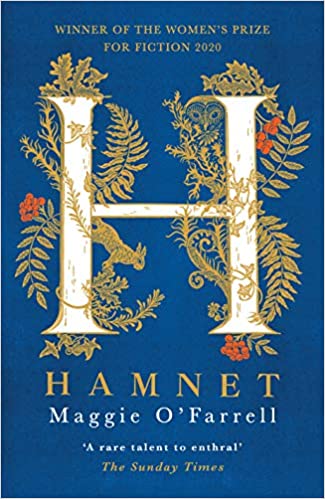
Hamnet
Remember me …
Maggie O’Farrell has taken a snippet of history and turned it into a richly descriptive and emotional tale of a young boy’s death, and how his mother, his father and his twin sister dealt with that death. That the boy’s father is a famous 16th century playwright –never named – lends a further piquancy to the tale.
Hamnet (or Hamlet as the name was also known in those times) wakes one morning to find his twin ill. He goes to seek help and is met with a blow from his grandfather and an otherwise missing household. His mother, Agnes, is tending her flowers and her bees in her old childhood home a mile away, while the others are on various errands. Having failed to fetch the physician, Hamnet returns to his sister and waits with her until their mother finds them. The sister is dying of the plague, and it seems that all of Agnes’s skills as a herbal healer are proving of no avail. Hamnet, ill himself, decides that death can be tricked into taking him, rather than his sister, and so it happens.
In between these bare bones of the story, we learn how Agnes and the boy’s father came to be together and how the marriage has evolved, including through months at a time of separation. When, a few years after Hamnet’s death, Agnes hears that her husband has written a play entitled Hamlet, without consulting or telling her, her furious sorrow takes her to London to confront him. And in that confrontation, she finds understanding.
There’s not much of a plot, there being no time slips, mysteries etc, but the characters make up for that in spades and more. Even the minor ones, even the kittens, are deeply drawn and alive to the reader. The writing is densely, gorgeously rich – so much so that towards the end I had to pace myself, feeling much as I would if I’d gorged myself on a box of dark, high quality chocolates and had to slow down to finish them off.
Well deserving of its Women’s Prize for Fiction 2020.
Women’s Prize for Fiction 2020
Hamnet Maggie O’Farrell
_________________________________
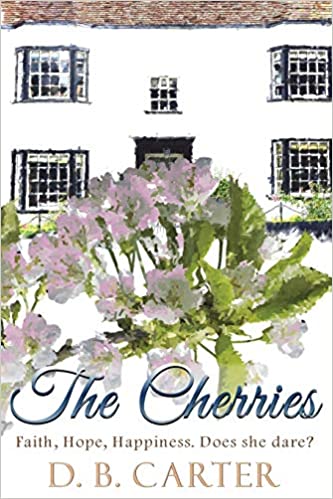
The Cherries
Faith, hope and love…
Mother and daughter Marian and Susan grasp the chance for a new start in their lives by moving to the country to live with Marian’s best friend Viv, lonely since her adored daughter’s departure to university a couple of years earlier. Marian and Susan own pretty much only what’s on their back, and Susan is also recovering from years of bullying and a deep sense of her own lack of worth. In the Georgian house next door, live Luke and his young protégé Dominic. Luke appears to have it all – sophisticated, knowledgeable, running a good business in old books, and kind and considerate as well. But he has his own demons. As does Dominic, struggling with his sexuality and the subject of bullying himself.
This is a tale of many characters, with several carefully interwoven sub-plots impacting the key characters of Susan and Luke. DB Carter’s strength is very much how he brings his characters to life, warts and all. Susan grows as she allows her artistic side to flourish, and she begins to accept herself, but then that growth is threatened by horrific circumstances.
There are strong messages here, of being willing to embrace change and to take risks, to accept the choices of others where these do no one harm, and of forgiveness. A charmingly told tale, with some dark moments, but uplifting.
The Cherries DB Carter
_________________________________
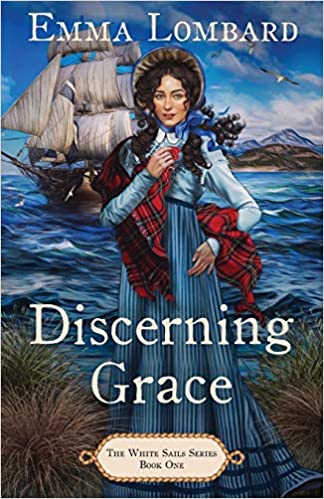
Discerning Grace
Wilful Grace Baxter, will not marry old Lord Silverton…
Grace Baxter has a terrible relationship with her rich parents, who have practically abandoned her to be raised by strict governesses. We can’t, however, feel sad for her, as she has the love of Uncle FarFar, a senior and highly respected personage in the Royal Navy, and the friendship of Billy, the son of the stablemaster. Besides, Grace doesn’t feel sorry for herself, at least not until she overhears that she’s be to wed to the gross, slobbery and totally unpleasant Lord Silverton. When Silverton shows just what he’s truly capable of, Grace takes matters into her own hands, and flees. Not just her home and London, but the country, and aboard a naval ship, disguised as a boy. Subsequently, Grace’s strong-minded and impetuous behaviour leads her in and out of all kinds of trouble, which implicates others too, with consequences I wasn’t expecting. Be aware, this story has lots of humour, but there are dark moments also, giving the story a rich emotional depth.
Emma Lombard’s debut novel, and the first in her White Sails’ series, moves at a fast pace and covers a lot of ground, or should I say a lot of ocean. Her research into life aboard a naval ship and into the exotic countries where Grace finds herself, is meticulous, and all the better for being used in a way which brings the reader on board (sorry) naturally, as if we are all as familiar with a foc’sle as the crew of Discerning. I love not having things explained to me.
There’s quite a cast of characters, and each of them is a real person, with backgrounds which we learn about as we go along, and with motivations and ambitions. This is particularly true of the handsome but imperfect Lieutenant Seamus Fitzwilliam, whose ship Grace has joined. We get to see the Lieutenant in two very different guises – one as the ship’s senior officer having to deal with all the problems of an ailing Captain and an unwanted passenger, and the other as a man falling in love with an obstinate young woman. Poor Seamus!
While the book wraps up nicely, there are background strands which I hope/expect Lombard explores in the next books in the series.
Discerning Grace is a book for lovers of adventure and danger on the high seas, of complex, interesting characters, and romance which isn’t all flutters and butterflies. A little touch of Pirates of the Caribbean, perhaps?
Discerning Grace Emma Lombard
_________________________________
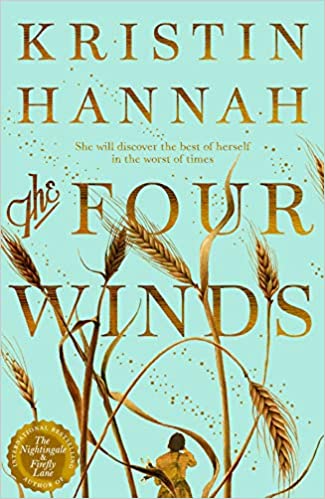
The Four Winds
A superb history lesson with a hefty dose of schmaltz & unconvincing development of protagonist.*
Normally, if I don’t like a book I leave it be. But when it’s garnered 1000s of 5 star reviews and it’s by a best-selling author, I get a little angry.
Elsa knows she’s ugly and not worth loving. Her rich parents and pretty sisters confirm this every day, although Elsa tries hard to be a good daughter and sister. She is so downtrodden, she prefers to spend her days in her room reading romantic novels to escape the unkindness of life. But one day she buys some silky red material on a whim, sews herself a flapper dress and wanders into town. Here she bumps into Rafe, a total stranger, and lets him make love to her. When Elsa falls pregnant, daddy leaves her at Rafe’s family farm for them to deal with her as they wish.
This is what happens throughout the book. Elsa faces many desperate situations, and trudges along, dealing with them in a dour, practical manner. I began to understand why the family were glad to see the back of her. And when, at the end of the book, we are faced with a new, strong Elsa risking her life for a point of principle, it was all too sudden, and too late. As for the supporting cast, I found them mostly to be shallow caricatures, being either good to saintly, or perfectly evil. And none of them interesting.
The redeeming aspect of the book was learning more about this dreadful period of American history, and how terribly the dispossessed were treated. For the rest, I won’t be rushing to buy this author again.
(*When I feel like this about a book, I go to the 3 star reviews on Amazon, after writing my own thoughts down. This is the heading of one of them. Seems I should have read that before I bought the book.)
The Four Winds Kristin Hannah
_________________________________
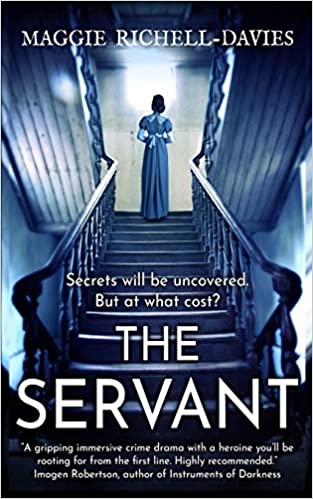
The Servant
I held my breath, hoping …
Young Hannah thought she was fine after all, having been rescued from the workhouse and now comfortable as a domestic servant in a houseful of kindly women, including the mistress. But when the mistress moves away and Hannah is contracted to a new family, the mysterious and not at all pleasant Chalkes, life takes a turn for the worse. The characters are well drawn and the author describes 18th c London in vivid detail. Clothes, household activities and – the key to the tale – moral standards especially those of the double-standard type, are brought very much to life. The contrast with the healthier life enjoyed even by the very poor in the countryside is starkly drawn. I held my breath hoping …
The real history which inspired the story is also fascinating.
The Servant Maggie Richell-Davies
_________________________________
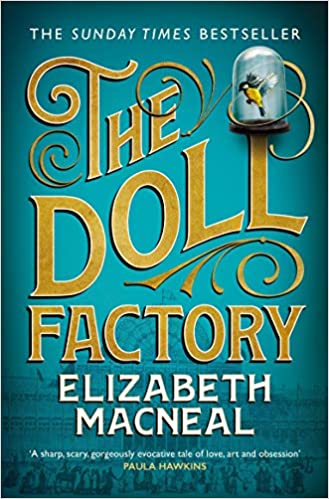
The Doll Factory
Depth of scene and character, beautiful imagery, make this highly appealing
Iris dreams of a better life than painting porcelain dolls. She wants to be a painter herself. Her twin sister Rose, sits beside her all day at the Doll Factory, sewing tiny clothes and eaten up with bitterness. Her face and body is ruined by smallpox, her so-close chance at a good marriage lost when she lost her looks. Silas, the taxidermist, has dreams too. Some are about the past and Flick, whom he loved. Most are about the future, and how he will raise himself to be as good as the gentlemen to whom he sells his stuffed doves and the ladies who buy his butterfly wing brooches.
What Iris and Silas have in common is Albie, a poverty-stricken street urchin with a good heart and a loving sister. And into all their lives comes Louis, the artist, and the Pre-Raphaelite Brotherhood (PRB). Louis transforms Iris’ life, but Silas wants her too, and he will do all that’s needed to make that dream a reality.
I was all poised to give this five stars. I was loving Macneal’s rich writing, the depth of her characters, the detail of her research – London in the mid 19thc was not a pleasant place to be unless you had money, and the PRB was of course a real movement although Macneal’s Louis was not among their members. The plot brought surprises, some you didn’t want. But the ending was a disappointment. It felt rushed, as if Macneal couldn’t wait to get the book over with (as an author I empathise!) and left me with an unsastisfied gnawing, like the unfulfilled promise of a rich dessert.
The Doll Factory Elizabeth Macneal
_________________________________
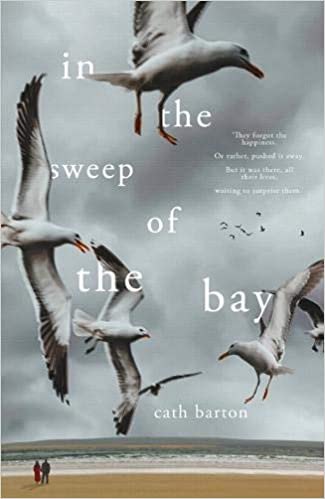
‘
In the sweep of the bay
…how little we know of other people’s lives, even our own parents. Perhaps especially our own parents.’
Cath Barton’s novella, published in Nov 2020, is a sensitive and beautifully written insight into the lives of Ted and Rene. They marry in the ‘frail optimism’ of the 1950s, she to take up the expected role of mother and housewife, he to continue with his career as a ceramics designer in the family firm. Over time, misunderstandings and the inability to talk to each other drive a wide wedge in their marriage. While to everybody else, including their own daughters, the couple appears perfectly devoted to each other, inside it’s a different matter.
I devoured this, both for its humanity and its writing.
In the Sweep of the Bay, Cath Barton
_________________________________
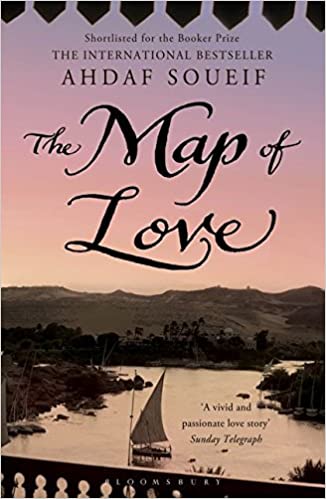
The Map of Love
‘My name is Anna Winterbourne. I do not hold (much) with those who talk of the Stars governing our Fate’
Ahdaf Soueif’s The Map of Love was first published in 1999. I didn’t remember reading it when I picked it from the book shelf looking for something before my new books arrived. No recollection either as I started it, but about half way in, a ticket to the Valley of the Queens tumbled from the pages and I recalled finally that I’d taken it with me when visiting Egypt in January 2001. A good choice, as Soueif’s deep knowledge of the country of her birth enriches these pages so that you feel you are truly there, especially the old Egypt. The story carries two timelines – the first in 1906 when Lady Anna Winterbourne, widowed, travels to Egypt to help her recovery from her husband’s death. There she falls in love with the country and with Sharif, a wealthy and fiercely nationalistic Egyptian landowner. In 1997, their descendants and those of Sharif’s sister, come together after decades of not knowing of each other’s existence. The story is told through modern and historic eyes, and what comes across strongly is the saying: the more things change, the more they stay the same.
There is a lot about Egyptian politics, both the British occupation and that towards the end of the 20th century. Fascinating to learn about. In between there is a beautiful old love story, and a more pragmatic modern one. Highly enjoyable.
The Map of Love , Ahdaf Soueif
_________________________________
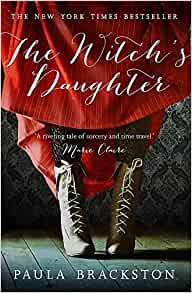
The Witch’s Daughter
Learned a lot about white magic, whether true or not, it was nicely portrayed
I enjoyed this book as a pleasant read, and certainly loved the 17th century Gideon, Bess and Ann story. I thought it became more melodramatic rather than dramatic as it moved on, and the WW1 story didn’t move me at all. Well, the horses did, of course. I’m a fan of magical realism and my own current work in progress has themes vaguely related to this book. I appreciated the way Brackston delved deep into wiccan lore and tradition – whether it’s correct or not, who cares, but certain aspects of the magical elements are beautifully portrayed, eg the wild animals (also a vague theme in my Guardians series where the young protagonist can understand the wild creatures and recruits them to her cause). What I would have liked is more subtlety and emotion around the later time tales and the ending rather than straight descriptions of people floating 10ft in the air and too obvious dialogue. Not sure I would buy more but if someone gave me another of hers I wouldn’t complain.
The Witch’s Daughter Paula Brackston
_________________________________
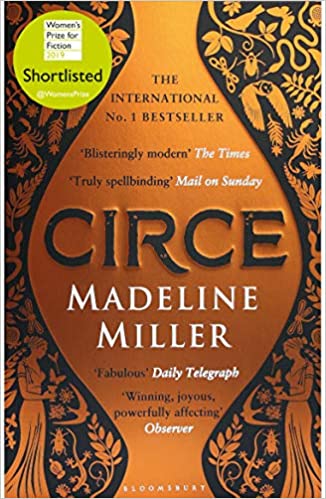
Circe
You don’t have to be a Greek legend expert to enjoy this brilliant book
A well-deserved international best-seller, I loved Madeleine Miller’s straightforward, no-nonsense Circe. An outsider from birth, neither powerful nor beautiful, Circe’s true power lies in something the gods fear – witchcraft. Exiled to her island, Circe is content, until the arrival of Odysseus.
While the tale is engaging, a ‘must read on into the night’, it’s the language which totally won me over.
‘Gods love novelty, as I have said. They are as curious as cats.’
And there we have the gods relegated to child status, not to be taken seriously. Except … one must.
And when Circe first discovers her ability with flowers and changes Glaucos into a god – ‘… his blue chest, strapped with god muscles, and … his hands, smooth as surf-rolled shells.’
Surf-rolled shells. Sigh.
I have yet to read Song of Achilles, probably about time I did.
Circe Madeleine Miller
_________________________________
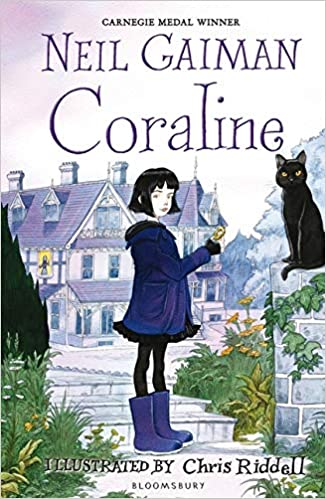
Coraline
Everyone from age seven upwards should read this
My granddaughter at age ten is a keen and productive writer. Her stories (and re-writes of mine) are highly imaginative and pacy, with characters who leap off the page and into all kinds of trouble. I was looking for books for her and came across Coraline, which was published after my own passed the age where they might have read this. An avid Neil Gaiman fan, it struck me as just the thing. I had to read it first before giving it to her (naturally) so we could talk about it, and I thoroughly enjoyed it although wondering what impact its nightmarish qualities might have on young children!
The scary passages are genuinely scary:
‘…it scuttled down the darkened hall fast, like a little patch of night.’
There’s heartbreak too when Coraline’s parents fail to appear. Coraline has been brave, making herself a meal, running a bath, putting herself to bed. But, at 3.12 am –
‘All alone, in the middle of the night, Coraline began to cry. There was no other sound in the empty flat.’
I genuinely worried about Coraline, more than she does herself, and feared for her parents.
The cat who helps out in the other place and was simply a cat in the normal (note I don’t say ‘real’) world is brilliant. Doubtless I’m late to the party but if you haven’t yet discovered Coraline, and whether or not you have the excuse of children, grandchildren, nieces and nephews, godchildren etc, read it!
Coraline Neil Gaiman
_________________________________
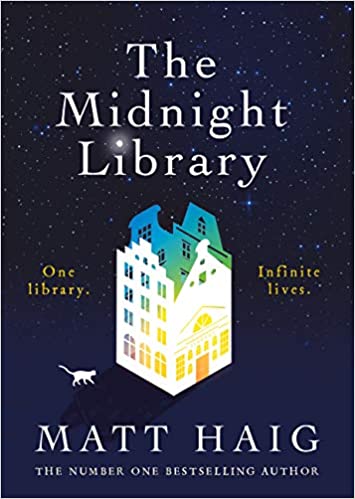
The Midnight Library
Not sure this would turn me into a Matt Haig fan…
While I have nothing to complain of in terms of the writing, I was disappointed in this. A woman at death’s door – having attempted suicide because life is basically shit and she’s thrown away every opportunity to live a different life – is offered the chance to go back, do things differently and settle for a life in which she’s truly happy.
Guess what? All those regrets she’s been carrying around turn out to have been damn good decisions after all. So where is her true chance of happiness? I won’t give away the ending but you can probably guess.
The reappearance of her old librarian friend as her mentor (I guess) through her journeyings added little to the story – a convenient person for the MC to complain to as it turned out. And the appearance of another person living the same experience added nothing and was in my view a great romance opportunity lost (as in the classic Replay).
The MC seemed to me too self-obsessed. It wasn’t even that she’d had a terrible life to bring her to the suicide point but perhaps I’m being too harsh.
The Midnight Library Matt Haig
_________________________________
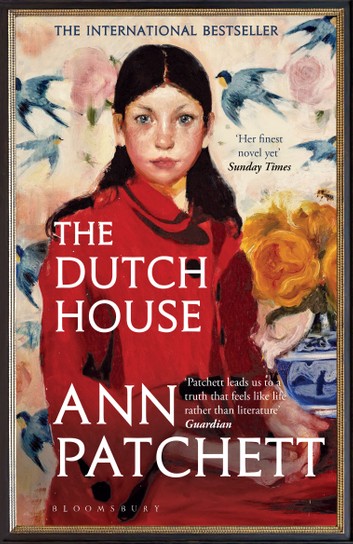
The Dutch House
Beautifully written study of the human state in its many frailities and some strengths
A novel worthy of its best seller status. The narrator, Danny, never really knew the mother who left her two small children and her husband to work with the poor in faraway India. She’s something of a saint to the two women now entrusted with Danny and his sister Maeve’s upbringiug. Maeve, much older, misses and blames her mother and their once warm father grows distant from his children. But whatever contentment the household has is cracked by the arrival of Andrea, splintered further when Andrea marries the father and brings her two daughters to live in the house, and finally shattered when the father dies and everything – the house, his business, even Maeve’s car – is left to his new wife.
The house – the Dutch house of the title – is where Danny and Maeve have always found solidity and comfort, but it is Andrea’s desperate wish to live in and own the house itself for its glorious over the top nature, which destroys their comfort and might destroy their lives.
The Dutch House, Ann Patchett
_________________________________
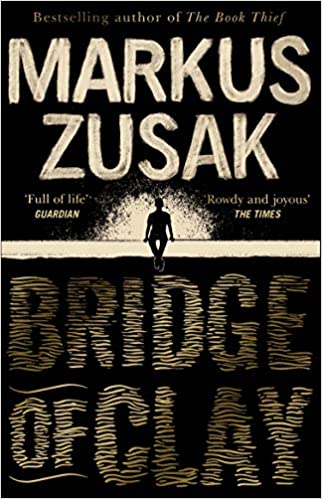
Bridge of Clay
I loved this for so many reasons, chief among them being its total unashamedly ‘Australian-ness’
Frankly I’m surprised anyone who hasn’t lived in Australia understands what’s going on, there are so many unique references and they’re important to the book. But apparently this hasn’t stopped Bridge of Clay becoming a best seller. From sisters (The Sisters Grimm), I turned to brothers – five of them, living not so ordinary lives in a Sydney suburb behind a race track. The narrator, the oldest brother Matthew, tells the tales of his mother, father and the fourth brother with exquisite emotional detail. There are no heroes here, just people who hurt a lot and act accordingly, including selfishly. But resilience is at the core of this book and Clay’s bridge is a wonderful metaphor. Loved it. (But if you’re expecting a repeat of The Book Thief, forget it!)
Bridge of Clay Marcus Zusak
_________________________________
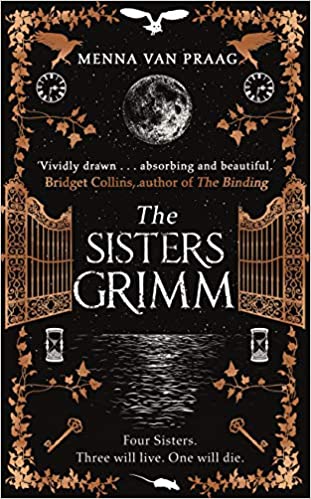
The Sisters Grimm
What do they remember? Will it be enough to save them and those they love?
I had this book on my TBR pile for some time and almost forgot about it until it popped up somewhere at the same time I needed to get in more reading material. So glad I added it to the order. Four eight-year-old sisters, all born on the same night, play in a white forest where they learn they have different, powerful skills -one can fly, one has a way with water, one with fire and the fourth with earth and rocks. But as they reach puberty they must leave the forest for a time and they forget … their power and their sisters.
Now, approaching their 18th birthdays, they must find each other and rediscover who they are – Sisters Grimm, born of one demanding father – if they are to have any hope of saving themselves and those they love.
Not completely a happy ending, but a satisfying one. I see there is a sequel coming out next year.
The Sisters Grimm Menna Van Praag
_________________________________
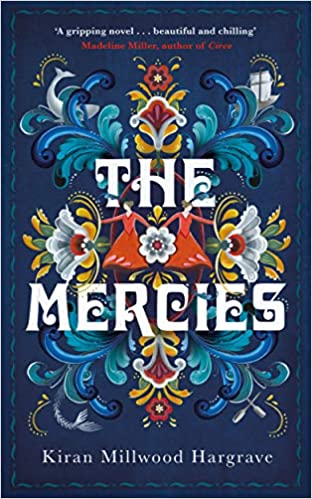
The Mercies
Winter, 1617. The sea around the remote Norwegian island of Vardø is thrown into a reckless storm. A young woman, Maren, watches as the men of the island, out fishing, perish in an instant. Vardø is now a place of women.
For a time at least, and the women find it tough but are managing. Then comes ambitious Absalom Cornet with his reforming zeal and iron morals. He has brought with him a young wife, Ursa, more used to civilised life as a merchant’s daughter in Bergen. Ursa needs a friend and she finds one in Maren, a woman of the island. Their friendship is fraught, two women from very different cultures, and it plays out to a dramatic end.
I was there on that bleak island with those women – Hargrave’s beautiful writing vividly brings their lives to light from the smallest domestic detail to their deepest emotions.
The Mercies reminded me strongly of my own The Shanty Keeper’s Wife with its theme of how women come to be blamed so easily for the sins of men.
The Mercies Kiran Millwood Hargrave
_________________________________
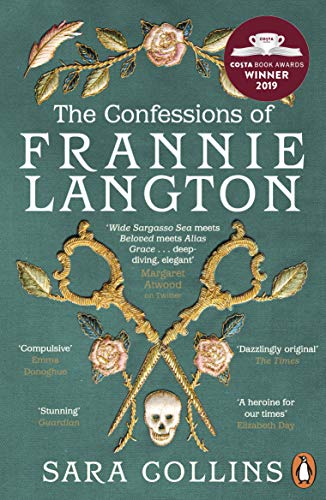
The Confessions of Frannie Langton
London, 1826 Frannie Langton is about to be tried for the murder of her master and mistress, Mr and Mrs Benham. But Frannie loved her mistress – how could she have murdered her?
Frannie Langton is born on a Jamaican plantation to a black slave and the master of the house, John Langton. As such she is neither slave nor free and has but one real friend in this world. When her father teaches her to read, Frannie discovers he is not acting from any alturistic motive. As a girl still she is sent to London to serve as the maidservant of Mrs Benham, whose husband is Langton’s ‘medical experiment’ partner. A deeply shocking and involving book, written with a sharp conciseness which allows us to get inside Frannie’s head and suffer with her. A must read for any lover of historical fiction and mystery.
The Confessions of Frannie Langton Sara Collins
_________________________________
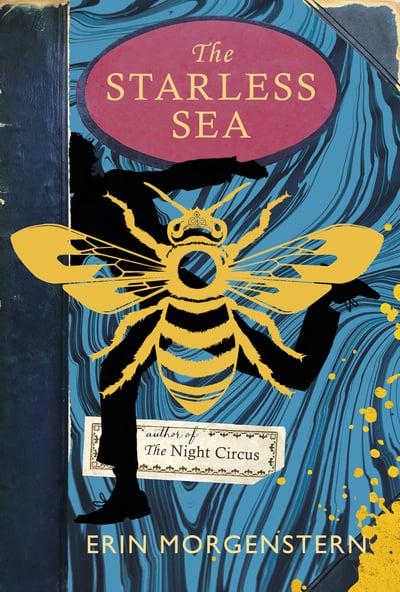
The Starless Sea
A bee, a key and a sword – clues on the cover of a strange book which will lead Zachary Rawlins into a labyrinth of stories and to Mirabel and Dorian.
I loved The Night Circus so this was a natural for me when it came out not too long ago (there appears to be no date on my hardback, signed copy and I wonder if this means something??) This is a book to take your time over, to curl on the sofa with the dog at your feet and/or the cat on your lap and fall into this world alongside the curious Zachary. A kind of grownup and highly expanded Alice in Wonderland, with gorgeous writing and – is there a plot? – yes, I think so. One to read again to find all those things you missed the first time. Pure pleasure.
The Starless Sea, Erin Morgenstern
_________________________________
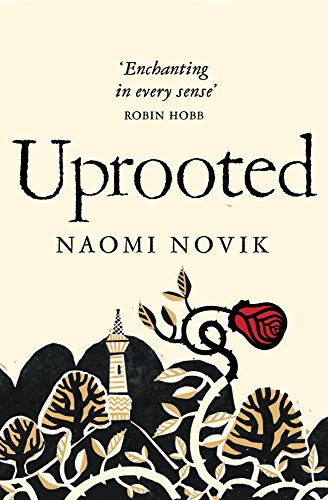
Uprooted
‘Our Dragon doesn’t eat the girls he takes …’
How can you not read a book with that opening line? It sets the tone of the world Naomi Novik builds so skilfully, a world where the Dragon – an ageless wizard – has protected Agnieszka’s village from the horrors of the Wood since time out of mind. He has a price however, and that’s for one girl from the village to serve him for ten years. Agnieszka is born in the right, or perhaps wrong, year to be a candidate but all expect him to take Agnieszka’s best friend, the prettier and brave Kasia. When he chooses her, Agnieszka embarks on a new life which is as demanding as it is – in the end – worth all her pain and despair.
A rollicking pace, alive characters and a story to keep your heart in your mouth, I loved Uprooted. And also Novik’s more recent Spinning Silver which makes you wonder what does go on in this author’s head.